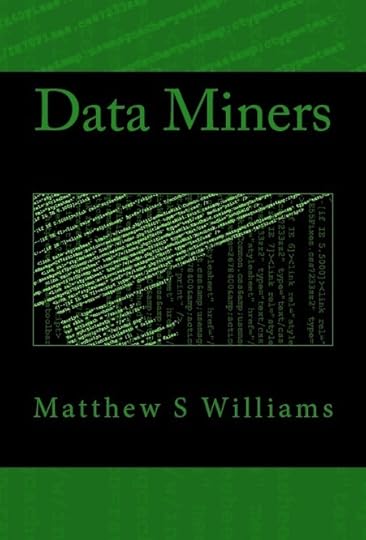Matthew S. Williams's Blog, page 218
April 9, 2012
The Hunger Games: Dystopia in YA Lit
 First up, some news for those who asked. Back when I started this dystopian thread, a lot of people asked about The Hunger Games. This was understandable, given that its a modern take on dystopian sci-fi, and currently very popular since it's being adapted into a movie. In fact, I got so many questions about it that I had to add an addendum to one of my posts, warning readers that it wouldn't come up, so not to ask. However, somewhere along the line I also promised that I would tackle and review it at some point.
First up, some news for those who asked. Back when I started this dystopian thread, a lot of people asked about The Hunger Games. This was understandable, given that its a modern take on dystopian sci-fi, and currently very popular since it's being adapted into a movie. In fact, I got so many questions about it that I had to add an addendum to one of my posts, warning readers that it wouldn't come up, so not to ask. However, somewhere along the line I also promised that I would tackle and review it at some point.
Well guess what? I just bought a copy! Yep, just as soon as I'm done my most recent reviews and posting chapters of my own upcoming novel (Data Miners), I will get around to reading this modern take on the classic dystopian novel. And, as a preamble, I thought I might include an article that I recently read in MacLeans. There, the author sought to shed some light on the issue of YA dystopian fiction, with particular attention being given to The Hunger Games. It raised some very interesting points before getting into the story, and so I thought I'd share them here.
Excerpt from 'The Hunger Games': your kids are angrier than you think by Brian Bethune:
"Imagine a life where possibilities are opening at a speed that veers unpredictably between exhilarating and terrifying. The familiar, precisely because it's familiar and safe, still tugs at you, but even so, you want out because your old life constricts as much as it comforts. Besides, your social milieu, which often feels like an endless struggle to achieve, or resist being slotted into some arbitrary niche—pretty, ugly, smart, dumb, athlete, klutz—is changing fast. You feel driven—by inner need and outside pressure—to make choices. Meanwhile, the manipulative, often harsh, powers that be, who created the larger world they're busy shoving you into, have clearly not done a bang-up job of it, either in their personal lives or as part of society. And they want you to get out there and fix their mistakes—just at a moment when worry over the imminent demise of their entire socio-economic structure is never far from the surface. It can be cruel and scary out there. Dystopian, even.
Chances are, anyone not imagining this life, but actually living it, is a teenager. And living it in an era of economic uncertainty, conspiracy theories and fear of environmental collapse. Western civilization used to produce literary utopias, but in the past century of world wars, financial panics, murderous totalitarian regimes and nuclear threat, dystopias have outnumbered sunny projections by several orders of magnitude. Pessimistic depictions of the future are now everywhere in popular culture. Teens and teen books are not immune to larger trends in society."
Wow. Quite the preamble. What I liked best about it was the way it summed up the origins of dystopia. In my own posts on the subject, I noted that dystopian literature was recent compared to utopian. But I failed to note that the truest examples of the genre only really emerged around the turn of the century. And the particulars of what inspired it seemed to have everything to do with the trends of industrialization, rationalization, class conflict and the increasing pace of change. These things have only become more pronounced as time has gone on, and with the addition of such issues as environmental destruction, gender equality, and racial bigotry.
Or, as the case appears to be with The Hunger Games, issues of age. Here we have a story where the young fight for the entertainment of the old. Or at least, that's one angle to the story. The issue of authoritarianism, reality TV, violence as entertainment and environmental catastrophe breading totalitarianism – these all appear to be present throughout, either as part of the background or as running themes.
I look forward to reading it. Review to follow, just give me some time! And here is the link to the full article (spoiler alert!):
http://www2.macleans.ca/2012/04/02/dystopia-now/








April 8, 2012
Data Miners – Chapter 3
Warning! Explicit and suggestive language follows (Like that ever scared anyone away!)…
It's Friday night and Prad feels like doing something while he's out of the house. He couldn't rope Angie into coming with them, but Sa'id and Achebe took him up on the offer. They needed a chance to discuss strategy before returning to their daily lives. Already Sa'id has a few people in mind that he would like to see associated with Dangle. He plans to email the list to Angie as soon as he gets home. He even thinks a few photo shop pics for the file would be nice. It seems a little overkill, but who the hell cares? All they need to do is create the illusion of something illicit, nothing that'll survive investigation. All that's really necessary is for the press to pick up on the scent of a possible scandal, a little something to make the Congressman's life more interesting before the next election.
They discuss the anonymizer Angie's planning on implementing. For a man like Dangle, who approved email surveillance for government employees, it seems like a fitting irony. The only question is which site she'll use. Prad knows she's partial to the Norwegians, though Russia has become good at producing such sites due to all the domestic spying they had to endure under Putin and Medvedev. Then again, there are plenty of Puget Sound services who offer similar services, thanks in no small part to eight years of Tom Ridge and Homeland Security spying on people's emails. After their first pitcher, they get into specifics of their own work.
"You and me can come up with some Icebreakers for the FBI, no problem, Prad," Sa'id says over his sudsy glass. "I got plenty of friends who would be more than willing to help. It's a dream come true, you know. I gotta thank Angie for giving me this chance."
"Assuming we don't get of course," Achebe says.
"It's just a one time thing right? And even if we fail, they won't know it was us."
"They could always find out the old fashioned way." Achebe looks over his shoulder at the other patrons. "Maybe we should be doing this from home… separately?"
"Naw, we need all our brains to do this. Angie did say our collaboration was key."
Prad is saying this. He has surprised his fellow members on more than one occasion by demonstrating his willingness to take orders from a girl. It surprises him too sometimes, but none of them seem to think of Angie as a girl. Achebe's concern seems more directed towards her methods though.
"All of us can do this from home and still stay connected, it's called a conference call."
"You trust your phone?" Sa'id scoffs.
"Then how about some MSN or Skype, Mr. Arab fucking nationalist?"
"Yeah, that's smart. The feds are a hell of a lot likelier to tap your computer than your phone, dude! Public places are way safer."
"Just wait til they start putting up cameras. This country will create its own version of the London Eye any day now."
Prad slaps the counter. "This is all fine and good, but it was Angie's call and we all said we were down, right? If you've got problems, Achebe, why did you agree to this?"
Achebe swills a little beer and his mouth and appears to be giving the questions some thought. "I don't know. Maybe I just don't like the idea of sitting things out while the boss lady is busy doing something dangerous."
"And because you like a challenge." Prad raises his glass and taps it against Achebe's. Sa'id joins them from the other side. At the very least, they agree that they can pull this off. No federal tracker is as good as any one of them. How could they possibly fare against three of them combined?
It all sounds too simple. With a little lubricant and enough testosterone, just about anything does. Sa'id and Kingdome turn down Prad's recommendation for a third pitcher and decide to call it a night. They have families and lives to get back to, which invariably forces Prad to go pick up his where he left off. He hops the el-train back to the Empire State towers and decides some television and a fat puff will be his entertainment for the remainder of the evening. Perhaps he'll even call up mom and dad for his weekly update.
Need to make some more friends, Prad reminds himself. Life has become incredibly monotonous since moving to Puget Sound. The Society has not filled the void just yet, nor has lusting after Angie taken care of the vacuum that is his love life. As he passes through the revolving doors to his building, he realizes he scarcely needs to speak to his parents at all. He's already telling himself everything they are going to. At least his mother at any rate, who will be concentrating on his love life. All he needs to do before getting to his apartment is lecture himself on finding a secure job and he'll have both parents covered. Such is the breakdown of his parents' advice; his mother covers love and companionship, his father career and finances.
"Mr. Pradchaphet?"
It is the doorman calling to him. Prad is surprised, mainly because the guy finally said it right. He looks over at the old man in the monkey suit with a look that says "what the hell do you want?"
"A package came for you sir. I was going to bring it to your apartment, but seeing as how you're here…"
"It's okay, I guess. What is it?"
Prad is escorted over to the front desk and eyes a square box wrapped in brown paper and tied shut with binder twine. His address is written in large black letters in what appears to be permanent marker. There is no return address.
"Who sent it?"
"I do not know, sir. It was left at the desk while I was on my break and no one remembers seeing who dropped it off. It was just here."
"Don't suppose you gave it a shake? Checked it to see it was vibrating?"
"Vibrating, sir?"
Prad shakes his head at him and places his ear to the package. It's not vibrating, or ticking, or emitting a funny scent. Could still be anthrax or some other crazy biological weapon. Or maybe it's a pipe bomb, courtesy of the local Minutemen who think he's a terrorist. Prad has always wondered why the heat Sa'id complains so bitterly about has never been directed at him. He's dark enough that some dumb hick might get it into their head to call the NSA or FBI on him. For years he's been waiting for a knock on the door or a kindly meet and greet with some cloaked figure in a dark alley. It's like waiting for a shoe to drop. But alas, he is beginning to sense that maybe they've caught on to the fact that neither of his heritages are particularly suspect. He eyes the package and tries to decide whether he's going to open it here or upstairs.
"I'll take it with me. If it's anything weird, I'll phone down."
"Are you expecting it to be something weird?" the old man asks.
"Uh…no. Never mind."
Prad leaves the front lobby and wonders where the doorman has been for the last decade. Blissfully unaware that paranoia has become a national canon. The package clunks a bit as he hoists it under his arm and boards the elevator. Whatever it is is not secured too well inside, and is clearly a few sizes too small for the box itself. His nerves are on high alert as he expects the contents to blow up or start leaking from the little thump. He pushes the button for the fourteenth floor (thirteen in reality) and the doors close.
The elevator hums to life and rolls upwards. He can hear the motors purring gently and feels his heart beating pleasantly fast. When the elevator stops on the seventh, it skips a beat and he's made all the more nervous when an older man steps on with him.
"Going up?" the man asks needlessly. Prad nods and tries not to look nervous, and fails. The man eyes him ever so suspiciously and steps in.
Hot date? Prad looks him over and thinks he's going upstairs to see some nice widow. He's decked out in a dapper black suit with a white shirt that looks to be faux-silk, possibly real. He has a dapper jacket on too, so he's probably picking someone up in addition to taking them out. Or maybe he's just stopping in for a booty call. Do men his age still do that? He smiles as he speculates as to the content of his wallet. Condoms, in addition to his platinum and senior citizen's discount card?
Prad checks the numbers again. They've reached floor ten. That's when it hits him. The doors are polished brass and highly reflective. The man has been watching him in the reflection the entire time. He could not have failed to notice how Prad was looking him up and down. And what's this under his arm? A big brown package with no return address? Well now Prad is feeling the sting of paranoid eyes on him. Or maybe he thinks Prad is one of the buildings many nubile queers, the up and coming boys who are moving into the valley and taking over prime real estate from old fag bashers like him. He feels strangely empowered.
The doors open on twelve and the man politely gets out. Prad is let down. Unless he's making a call to the authorities, Prad's been imaging the whole thing. Ah whatever, it was fun while it lasted. And guiltily, he realizes he forgot that by even being in the same tight, confining space with the man, he might have been risking his life. If the package is indeed some leaking biotoxin, then he just killed the poor fellow, or possibly made him and his date very sick. At least he won't be alone in the emergency room tonight.
The elevator passes the phantom thirteenth floor, reaches fourteen and dings. It takes less than a minute for Prad to make it to his apartment, get inside and fetch the pair of industrial scissors that came with his knife set. Taking a deep breath, he cuts through the twine and starts making a seam along the paper. Once he's cut the box from one end to the other, he gently tears it off and peaks underneath. It's a shoebox, Merrell's from REI, which is indicative of something, he thinks. But it's still just a shoebox, and he hasn't even risked a peek at the true contents yet. He feels strangely let down and relieved again. No one would ever pack a bomb or a bio-agent into a shoe box. If the Anarchist cookbook doesn't contain a section on that, well then it damn well should!
The edges of the box are secured with duct tape, which renews his sense of worry for just a second. If he were packing this box with something that wasn't supposed to get out until opened, he would be using duct tape to seal it. The scissors come into play again. It's an old habit that he can't just rip the tape of something or tear into a package. Not being subjected to Christmas while growing up can do that to a person. They just don't know how to devour a package. Nevertheless, his efforts are rewarded when he finally slits down the length of the last piece of tape. The eight pieces are easily removed and lay in a heap on his table. Eight silver strips in six and twelve inch lengths.
He takes a deep breath and removes the top.
It's a book… shit.
Not just any book. A copy of Koestler's "Ghost in the Machine" is staring up at him from inside. There was a note attached to it, a yellow sticky with cryptic instructions scrawled in fine ink.
Read it. Learn!
Already Prad is starting to feel annoyed. There is something inherently unsavoury about being instructed to learn. It takes all the fun out of it. Learning is most enjoyable when it goes against the grain, when it's something you're not supposed to be doing because it threatens the establishment. And the ultimate letdown of knowing that no one considers him important enough to kill him makes it worse.
He picks the book up and looks it over, just to make sure its not somehow rigged or booby trapped. He sniffs the pages, musty but harmless. The spine is intact, the cover not lined with some tactile poison. Nothing's wrong with it at all. It actually looks like it's in fine shape, like whoever sent it had the good graces to order a good copy through Amazon.com.
Who the hell sent this, he thinks as he opens it and flips through the pages. Probably Angie, he thinks. Something involving dating tips would probably be more appropriate given the tenor of their last conversation, but getting him to learn is something she would not pass up. The subject matter in undeniably Society as well.
The phone rings, causing his heart to jump again. He puts the book down and grabs the wireless from its cradle on the kitchen counter.
"Hello?"
There's no answer, just dead air and the almost imperceptible sense of something breathing in the background. His paranoia is starting to tingle again.
"Hello. Who is this?"
Another long pause. He strains to hear the presence of breathing but can't be sure.
"Who the fuck is this? Answer me, you sick cunt!"
"Yamal?" an overtly feminine, high-pitched voice says.
Oh double shit! he screams internally. All the way from Bangkok, the one person he can never allow himself to say "shit" to has just heard the worst he's got.
"Yamal?! What are doing talking like that?!" she demands.
"Sorry, ma," he says sheepishly. "Thought you were someone else…"
And Friday night becomes the night from hell. What should have been a routine conversation about his inadequacies has become a full-fledged double-barrelled denunciation. He estimates, as his mother tears into him with fire and brimstone, exactly how many angry calls he will be getting from relatives, coupled with the amount of time it will take to live this down. He gives it about a year, six months at best.
When at last the conversation is over, he ear feels hot and swollen. His dignity is similarly flayed, having been subjected to every bashing his mother could manage. Time for a smoke! Locating his vaporizer and his baggie, he loads a nice fat piece into the chamber, grabs his torch and then heads for the balcony. Another nice feature of the Empire Towers, the lovely terraces overlooking the emerald city at night. It's actually quite pretty tonight, the air cleansed by the wave of ocean air that's finally sent it all to Tacoma and Olympia.
He settles into one of the chairs that came with the patio set, the one with the glass table that has the natural bumps and imperfections in it. He settles his feet onto the glass, lights the torch and puts it to his vaporizer. He sips the sweet, cloudy nectar that forms in the chamber, knowing that in a moment, he will have forgotten all about the day and its debacles. At least for a little while…
You were warned  …
…








April 6, 2012
New Website: Grim5next!
 Not long ago, I joined a new writing project, known as Writer's Worth, which I learned about through Goodreads. At the time, I thought it might be a good opportunity to rub shoulders with other writers, get some promotional stuff going, swap ideas, etc.
Not long ago, I joined a new writing project, known as Writer's Worth, which I learned about through Goodreads. At the time, I thought it might be a good opportunity to rub shoulders with other writers, get some promotional stuff going, swap ideas, etc.
However, in the few shorts weeks that I've been part of this group, I've found so much more worth than I expected (yes, that was a pun, my apologies!) For starters, we've commissioned an anthology project known as "Worlds Undone". This book not only gave me a chance to write what I like best, dystopian lit, but also inspired me to explore the genre of dystopian sci-fi more fully.
And that, I am pleased to note, led to my being "freshly pressed" for the first time! Yep, it seemed that the first article in my dystopian series – entitled Dystopian Science Fiction – garnered some attention over at WordPress.com. As a result, I got more traffic in two days than I have in over a year. Or, to put it another way, I tripled my overall amount of hits. Went from just over 3000 views to just over 11000 in the thirty-six hours. Wow…
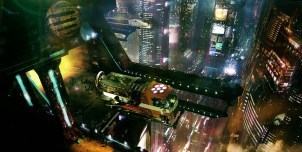 Yeah, that was nice. But not as nice as my new group coming together to develop this anthology. And since I have some experience with the self-publishing thing, I volunteered to tackle the dust-jacket design and produced some pretty kick-ass covers, if I do say so myself. But I can hardly take all or even most of the credit.
Yeah, that was nice. But not as nice as my new group coming together to develop this anthology. And since I have some experience with the self-publishing thing, I volunteered to tackle the dust-jacket design and produced some pretty kick-ass covers, if I do say so myself. But I can hardly take all or even most of the credit.
No, the real credit goes to the artists – Ashley Evans and Alex Popescu – famed artists who agreed to let us use their cover work to fashion a decent cover. I also posted top contenders in a photoshare over at Shaw. However, the winner will be posted on the website itself soon, so feel free to come by and check it out. We could use some outside opinions, just to make sure we're not patting ourselves on the back too much!
In any case, named in honor of our first anthology, the site is called Grim5next, since the anthology contains three categories: "Grim Futures", "Last 5 Minutes", and "What's Next?". It's an exciting process, and I look forward to the end product! Stay tuned if you want to know how and where to get a copy 
http://grim5next.blogspot.co.uk/








Data Miners – Chapter 2
He's arrived early. H-hour, eighteen-hundred hours, at the Seattle Coffee House, one night since receiving the email. His dark shades block out the harsh reality that is stinging his senses. Last night's activities have left him a little sore and sluggish. But he'll suffice for tonight's engagement. He steps a few feet away from the barista at her serving station and does a three-hundred sixty degree survey of the room. He spots a woman in a dark suede jacket and black glasses sitting in the corner nursing a 20 ounce cup. A mountain of curls hangs from her head, draping over her shoulders and down to the handbag that swings from the arm rest of her mahogany chair. He smiles and steps up to the bar.
"Twelve-ounce macchiato, extra strong," he says to the sardonic white kid with the braces and a constellation of zits. He demands an exorbitant amount of money in exchange.
"Here you go," he says, forking over a five and rummaging around for some loose change. Such is the price of fair-trade and inflation. He receives his cup from the barista and walks over to the self-serve doctoring station where he adds lots of milk and several spoonfuls of the coarse brown sugar. He pauses and wonders if it is fair-trade too. Some sugar farmer in the Caribbean could be living a better life thanks to his preference for sweetness.
Speaking of which, Angie is waiting. He walks over to her table, trying not to seem overly casual. As he walks, he wonders what it might be like to bury his nose in that mountain she's sporting on her head. He's come close once or twice, the scent still comes back to him in rare flashes. Lilacs and cherry blossoms, or at least what he imagines they would smell like. Her lips are encrusted with rubies. What do rubies taste like, he wonders? Cherry?
"Angie," he says as he takes a seat opposite her.
"Hello Yammie," she says in return. "You're early, as usual."
"Figured I'd get a good seat this way, opposite you."
She sips from her cup. He notices the Chai tea tag hanging from it. "Hope you enjoy the view," she says. "I'm in a bitchy mood."
"With you, dear Angie, any mood is heightened by the mere fact of your presence."
She scowls at him from behind those dark glasses. "If I've told you once, I've told you a thousand times, there's no way, Yammie. Now just sit still and wait for the others."
He smiles like a boy who's been chastised by his pretty teacher. She's taken the challenge to heart, it seems. He still doesn't know what it is exactly, but it's clear it's got her peeved.
"While we're waiting, how about we talk about turn ons and turns offs?"
"Been reading too many porn mags there, Yammie?"
He chuckles, suddenly aware that the dope hasn't totally worn off. She's conjecturing that too much exposure to pornography has convinced him that this is how men and women communicate in real life. She's not entirely wrong, but who the hell reads magazines anymore? He doesn't dignify the accusation with that response for fear of revealing too much about himself. At this point in their relationship, he figures what she doesn't know won't hurt his chances.
"What about favourite sites to cruise? Can I ask you that?"
She takes another sip of her Chai and thinks it over. She shrugs. "Misinformation and Monster Dicks," she says casually. Prad laughs so hard it turns some heads in their directions. He looks back at them and waves, the mandatory gesture to show he's not crazy. When he looks back at her, he notices she's pulled her glasses down to reveal her shiny hazel-greens. Her eyes could slice through metal, they are that focused on him. And she doesn't look too happy.
"Are you fucking high?"
"What? Noooooooo…"
She is unconvinced and keeps staring at him with that penetrating gaze. Slowly, the glasses go back into place. He's a little self-conscious now, even though he's told her the truth, sort of. It's been less than six hours since he embraced the Purple Haze. It was intended to get him through the afternoon but he hoped to be sober enough by this point. Unfortunately, he skipped his after work nap that was supposed to sleep off the last of it. Idle conversation proves to be a losing game after that. Prad, in spite of his playful antics, is not immune to being shot down in the most blatant of ways.
Luckily, it doesn't take long for the others to arrive. One by one, two by two, they file through the front door wearing attire appropriate for the evening's "briefing". There's Lynette Bradford, DeeMark "Fiddlergrrl", Tommy "OnKrack" Chu, Claude "Voodooman82″ Mecklenburg, Sam "Sandngrr" Sa'id, Tania "Cutegrrl" Zeta, Zuhair "Mohandas5323″ Subramanian, and Arthur "Kingdome" Achebe. These are the sum total of the Society, the best and brightest in their respective field, or at least they say so. All are dressed in dark leather or suede jackets, wearing the same dark glasses as Angie herself. They don't look too conspiratorial walking directly to her table, only a few stopping to order caffeinated beverages.
"Okay, thanks all for coming, so I'll get right to it. We've been challenged." This is how she opens when they all sit down. Everyone leans in to listen attentively. Prad gets a few nods from people acknowledging him as they crowd around and press forward so they can hear better. Suddenly, Prad is feeling pinched and suffocated. And he resents the loss of privacy with his dear Angie, who seems to have all but forgotten about him as she prattles about their mission.
"The DeePs are known for being assholes to us measly miners, but this is one I couldn't well pass up. And it's a big one, a risky one, so if anyone has any doubts or feels like they don't want to be a part of it, now's the time to say so. Walk away now, and I promise, no one will think less of you."
Achebe raises his hand and smiles at his own gesture. He looks like an oversized schoolboy vying for the teacher's attention. Angie calls on him accordingly.
"Yes, Artie?"
"I for one would like to know what the challenge is before I make up my mind. I think everyone would."
Nods and murmurs of agreement around the table. Angie nods approvingly and begins to lay it out for them.
"As you all may know, there has been some serious scuttlebutt recently about a certain Congressman who has a long and checkered history, and a strange ability to get re-elected in spite of all the shit that comes out of his mouth. His hobbies include waving the Confederate flag, denouncing the enshrinement of civil rights in state charters, and hanging nooses on the tree outside his office."
Some of the group laugh. They, unlike Prad, it seems, know exactly who she means.
"More recently, his activities included getting anti-gay marriage legislation passed, domestic spying, calling his opponents queers and terrorist sympathizers, and demanding that our current president produce a birth certificate because he doesn't seem to trust his allegiance. Ah, fuck it, you know who I mean!"
By now Prad and the remaining clueless apoliticos are catching on. Sa'id spells it out for his own satisfaction.
"Congressman Dangle, that cocksucker."
"Right," says Angie. "The DeePs seem to agree with me that this man needs a good ass kicking since his constituents are in the habit of re-electing him. They thought it might be nice if someone were to provide proof of his past affiliations, something that no one could deny. I told them that if they thought so, they should hack into his campaign d-base and dig up some dirt, like they always do. But they said they already tried that a few years ago. They looked into who's been financing his campaigns and who he's shaking hands with."
"Nothing incriminating?"
"Nothing illegal," Angie replies after taking a sip of tea. "Any shit he's done or asses he's kissed has been out in the open. Worst thing anyone could find on him is that he takes contributions from the Christian Right and shakes hands with them in public."
"Stuff any idiot would know," Prad says.
"They got nothing?" Sa'id says, incredulous. "Those DeePs found nothing on someone like Dangle and they admitted it?"
"And it pissed them off to no end. I taunted them about it, but they claim that Dangle must be clean, or just good as faking it. In either case, they figured that if some dirt didn't exist, that someone ought to create it and put it where it could be found."
Prad's eyes widen and a few people begin to push themselves back from the table. Sa'id and a few shush them and look around to make sure no one is listening in. Their volume has exceeded tolerable levels. Enough noise and even the patrons of a Seattle chain will start to get nervous about a left-wing conspiracy.
"Like I said," Angie goes on. "Anybody's not into this, now's the time. The challenge is straightforward, but challenging. We hack into the FBI d-base, find ourselves some good old fashioned domestic terrorists, and add a little information to their file that suggests they knew and were on good terms with Dangle. Nothing major, just something that's going to throw up some red flags at FBI headquarters on Wednesday morning."
"Sounds dangerous, and borderline sleazy," Achebe says. "But if you're gonna' do it, count me in."
"Me too," Sa'id says. As a man of Arab descent, he's waited years to get back at the assholes who made life hell for him and his family. The years in which he couldn't get a job and had to move back in with his parents he blames wholeheartedly on these people. Between the years of oh-one and oh-nine, there was nothing scarier than a Moslem with a high-tech degree.
"I'm in," Tommy Chu says and raps his knuckles against the table.
"Not me," says Tania. "Sorry Ange."
"It's okay," she says with a raised hand. She knows Tania has just started a job with a company that does government contracts and can't risk anything that might land her in hot water with her superiors. The Jerk follows shortly thereafter.
"I'm still on the INS watch list. I can't."
"Yeah, I'm not so sure I'm out of the woods on that either," says Zuhair, who is trying to bring his parents over from Sri Lanka. Angie gives them both a gentle smile of understanding.
That leaves Prad, who feels at least four sets of eyes on him. Three in, four out, and Angie leading the pack. At this point, he could go either way. The thought of committing a federal crime is scarier than shit to him. On the other hand, he would be defending Angie's honour. That proves irresistibly appealing to him, and he has no intention of getting caught either. No ass-bound federal tracker could catch him, not when he's in the ether.
"You know, Sa'id," he says, trying to stall. "Claude is right about the INS and all. You got the NSA to worry about yourself, you sure you want to do this?"
"Fuck it, man. And fuck them too. They've been breathing down my neck for years, they should be sucking on my ball sack now."
Angie is still looking at him from behind those dark glasses. He feels her penetrating gaze slicing deep trenches through his forehead and eye sockets. "What the hell, I'm in."
"Alright," Angie says. He thinks he sees a smile forming. He wishes he could see her eyes. Oh God, let her be excited, he prays. If she's excited, it means there's still hope of getting her spread eagle on his keyboard.
An hour later, they've drunk their coffee and tea and eaten their biscotti and muffins. When they've discussed all other matters, Angie says good-bye to Tania, Claude, Tommy, Zuhair and Lynette, leaving her with just her co-conspirators. This is best, Prad reasons. The less they know at this point, the better. The thought makes him gleeful. Being part of something conspiratorial just feels so… exciting!
"So where is this going down?" Sa'id asks.
"Well, for security reasons, none of us should be using our home computers. Plus, I want us to be in communication range of each other."
"Internet café?" Chu recommends.
"Better, the Puget campus computer lounge."
"Public internet provider, we'd need an anonymizer," Sa'id says.
"Not a problem, we all know where to find those."
"Don't you need a student ID to get in there?" Prad reminds her.
"I got a friend at Puget," Angie declares. "They'll get us into the student lounge, Tuesday night at midnight. Nobody but on-line gamers and a few keeners are up that late, so we'll have the run of the place. Likely, no one will take notice and they probably won't care if they do. Colleges are full of anarchists."
A shared laugh, leaving only one question.
"What about security?"
"You mean how do we get past the congressman's ICE?" Angie looks at Prad. Those are supposed to be Sa'id's specialty, but considering his background, he can't be caught making those. And Prad knows he's just as good, he's beginning to suspect Angie knows it too from the way she's looking at him.
"I'll work something up," he declares. "Dangle's trackers won't know from which direction I came from. I'll be like a sniper in the jungle. Pop! Pop!"
He holds an imaginary rifle and squeezes off a few rounds at his imaginary enemy.
"Okay, shut up. So it's agreed, we'll do it from Puget next Tuesday."








April 3, 2012
Worlds of Dune
Hello all and welcome back. Starting today, I thought I'd get into a cheerier aspect of the science fiction. Not that I don't looooove dystopian stuff, but after days and days of romping through endless examples of totalitarian, cyberpunk and just generally dark futures, I thought it might be time for a break. And it just so happened that I had an idea the other day which seemed like the perfect diversion. For those who read my site regularly, you might have noticed I did a long list of conceptual sci-fi posts. Well, today I thought I'd get back into that some.
To break it down, I wanted to do a piece that was dedicated entirely to "Cool Worlds", an exploration of the various planets, cultures and civilizations science fiction has given us over the years. However, after coming up with just a few candidates, I quickly realized my mistake. There was no way I could possibly list all the best examples in just one post. And if I settled on just a few, then people might start writing in and saying "what about this one? what about that one?"
So rather than do all that, I decided instead to tackle specific franchises, particularly ones that made it into my Galactic Empires post, and address some of the cool worlds that existed within.And what better place to start than with my favorite galactic franchise, one of the most detailed franchises ever to be dreamed up: the venerable Dune!
Anyone who is familiar with Frank Herbert's six volume series knows that he was pretty damn good at weaving an intricate and finely layered tale. One aspect where this was particularly evident was in his descriptions of the Imperium's planets. Not only would Frank dedicate a great deal of time and effort to describing what a place was and what significance it held, he would also get into the lesser explored areas of ecology and what impact that had on a planet's culture. Here are some of the best examples that I could think of, all from his original books:
Arrakis:  The focal point of the Dune universe, and the most important planet in the entire franchise. It was here that the spice was manufactured, where Paul Mua'dib came face to face with his destiny, and "The Tyrant" Leto II was born and ruled for three and a half millenia. It was also eradicated when the Honored Matres attacked the Old Imperium, triggering a full-scale war which would lead humanity along the final steps of the "Golden Path". In short, it was the backdrop for most of the story, and from a storytelling point of view, a very richly detailed place!
The focal point of the Dune universe, and the most important planet in the entire franchise. It was here that the spice was manufactured, where Paul Mua'dib came face to face with his destiny, and "The Tyrant" Leto II was born and ruled for three and a half millenia. It was also eradicated when the Honored Matres attacked the Old Imperium, triggering a full-scale war which would lead humanity along the final steps of the "Golden Path". In short, it was the backdrop for most of the story, and from a storytelling point of view, a very richly detailed place!
Much of what is known about Arrakis' culture and ecology comes from the appendixes of the first novel where Herbert wrote about the fictitious exploits of Dr. Pardot Kynes, planetary ecologist to the Imperium. However, a great deal more came through in the course of the story once Paul and Jessica find refuge amongst the Fremen and had to learn their ways and secrets in order to survive. Much of this has to do with the spice, the Sandworms of Arrakis, and how the production of the former depended on the life cycle of the latter. They also came to learn about the Fremen's plans to alter the planet's ecology using moisture traps and water caches, as well as the careful introduction of plants and grasses to anchor the dunes.
Basically, Arrakis was a desert planet where moisture was the most precious commodity in existence. A fitting paradox, seeing as how the planet's desert environment was essential to the production of spice – the most precious resource in the known universe. Two things permeated this environment, both of which kept outsiders away and ensured the security of the Fremen who lived in the deep desert. The first were the Sandworms themselves, the predominant life form on the planet. The second, though no less dangerous, were Arrakis' famous sandstorms.
According to Dr. Yueh, worms measuring up to 450 meters had been captured and studied, but that ones which were larger still had been seen in the deep desert where no citizen of the Imperium had ever ventured. Living beneath the sand, the sandworms would be attracted to rhythmic vibrations coming from the surface. Knowing this, the Fremen were forced to develop a way of walking arrhythmical when forced to do "dune-crossings". At other times, when they sought to ride the worms, they would plant "thumpers" to draw their attention, and then mount the worms once they came to the surface.
The worms were also the producers of the spice, which they used to fabricate nest for their young ("sand trout"), which would then leave before the nest underwent a chemical reaction, triggering a "spice blow". Because of their central role in the life cycle of Arrakis, and the fearsome and awesome nature of the creature itself, the Fremen regarded them as godlike creatures. Shai-Hulud, "the old man of the desert", was the name given to mature worms while "the Maker" referred to the worms role in the production of spice and the life cycle of the planet. Though Zensunni's by descent, believing in a God that was transcendent, the Fremen still seemed to attribute some degree of divinity to the worms themselves.
Similarly, sandstorms were common to the Deep Desert, and also the reason why the capital city of Arrakeen was built within a protective outcropping of rock known as the "Shield Wall". According to the expanded universe, sandstorms on Arrakis were electrically charged and could reach up to 500 km/h, powerful enough to destroy vehicles, equipment and strip anyone unlucky enough to be caught outside in one down to their bones! Due to the havoc they played with navigation and harvesting, all activity beyond the Shield Wall had to be timed to ensure that it happened between storms, otherwise harvesters could wind up buried beneath tons of sand.
As expected, the harsh and unforgiving conditions of this planet did much to shape its inhabitants. The "Fremen" as they are called (play on the word Free Men) were what could be expected from a nomadic desert people who were used to oppression. Recluse, mysterious, pragmatic and extremely tough, they were both feared and loathed by an Imperium that knew little about them and could not control them. However, once Paul and Jessica managed to penetrate the Fremen society by proving their worth to them, they began to see that the Fremen were also capable of extreme hospitality, fierce loyalty, great patience and uncompromisingly dedication.
Over the course of the six original novels, Arrakis was transformed from a desert planet into a lush green world, only to then be transformed back again. This had much to do with the plans of the Fremen, but also to Leto II's "Golden Path". In the end, it was realized that the spice-producing worms, and even the Fremen themselves, would not survive the ecological transformation, but once Leto died and the worms were reintroduced to the planet, spice production and desertification once again resumed. Knowing that worms were responsible for removing all traces of poisonous water form the planet, the Sisterhood began using some to conduct their own ecological transformations on Chapterhouse after Arrakis was destroyed.
The Fremen themselves had a saying which pretty much encapsulated their world and themselves: "God created Arrakis to train the faithful".
Caladan: Although comparatively little time was spent detailing this planet, Caladan was nevertheless an important planet in the Dune universe. It was the ancestral home of House Atreides, Paul's birthplace, and would eventually become the sole property of Jessica after Paul became Emperor and moved his seat to Arrakis.
Although comparatively little time was spent detailing this planet, Caladan was nevertheless an important planet in the Dune universe. It was the ancestral home of House Atreides, Paul's birthplace, and would eventually become the sole property of Jessica after Paul became Emperor and moved his seat to Arrakis.
Based on various descriptions from the original novels and expanded universe, Caladan was an ocean planet with few landmasses to speak of. Because of its relatively mild and agreeable climate, House Atreides was spared the expense of weather control measures. It's primary exports consisted of biomass, plus the important agricultural produce known as pundi rice. In addition, it also traded in whale fur, gemstones, wine, corals and livestock.
According to Paul's father, Leto I, House Atreides ruled this planet through air and sea power, for obvious reasons. When describing his world to Chani and the Fremen, they were incredulous to know that on some worlds, water was so commonplace that it formed oceans as big as the desert, or that plants could grow so thick that they were impassable.
Clearly, Caladan was meant to serve as a sort of Edenic setting compared to the hostile and rugged landscape of Arrakis. In addition, Paul's exile into this harsh wilderness after the death of his father could be interpreted as a fall from grace, which he then reconciled when he became the prophet and religious leader of the Fremen and returned in the end to claim the throne. If there's one thing Dune was known for, its religious allegories!
Chapterhouse: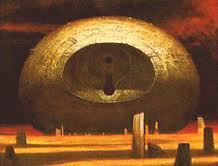 The home of the vaunted Bene Gesserit training facility in the later books of the series. In the original Dune, this facility was located on Wallach IX and had been for some time. However, five thousands years later in Heretics of Dune, the location had been changed to Chapterhouse. In the following and final novel, Chapterhouse: Dune when the Honored Matres began there assault, it was noted that Wallach had fallen to their advance.
The home of the vaunted Bene Gesserit training facility in the later books of the series. In the original Dune, this facility was located on Wallach IX and had been for some time. However, five thousands years later in Heretics of Dune, the location had been changed to Chapterhouse. In the following and final novel, Chapterhouse: Dune when the Honored Matres began there assault, it was noted that Wallach had fallen to their advance.
According to the descriptions from Heretics and Chapterhouse, this planet was a green and fertile world. However, with the destruction of Rakis (Arrakis in the later novels) and the death of nearly every sandworm in the known universe, the Bene Gesserit began the process of terraforming it into another desert planet where the worms would be able to thrive, thus giving them control over the only source of spice in the universe.
Throughout the latter books in the series, the Bene Gesserit kept the location of this world a secret to protect it from the Honored Matres. They even went so far as to station a fleet of no-ships around the planet to ensure that no one would be able to locate them with prescient ability.
Geidi Prime: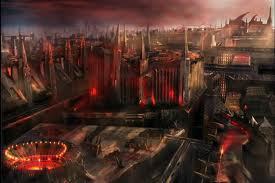 The homeworld of House Harkonnen. And if the religious metaphor which I alluded to earlier is to be believed – where Caladan is Eden and Arrakis is the real world- then this place would definitely be hell. In fact, judging by the many descriptions made of this planet and its rulers in the original series, the hellish metaphor is so thick you could cut it with a knife!
The homeworld of House Harkonnen. And if the religious metaphor which I alluded to earlier is to be believed – where Caladan is Eden and Arrakis is the real world- then this place would definitely be hell. In fact, judging by the many descriptions made of this planet and its rulers in the original series, the hellish metaphor is so thick you could cut it with a knife!
In the original Dune, we are given descriptions that emphasize the planet's industrial nature. Hints are also given that the planet was highly volcanic and covered in wastelands. In addition to its many factories, large arenas were also built in most cities, where gladiator duels were held to entertain the populace. The Baron's nephew, Feyd-Rathau, would often compete as a way of gaining popularity amongst the people and demonstrating his skill.
Also, in the original and subsequent novels, much is made of the Harkonnen's sense of brutality and perversion. Whereas the Baron delighted in little boys, whom he would often kill in the course of molesting them, the planet's artwork and decor often emphasized sex and violence.The Baron's appearance, which is described as being so "grossly and immensely fat" that he requires an anti-gravity device just to get around. In addition, he described himself as "always hungry".
In Heretics of Dune, when Miles Teg and the ghola of Duncan Idaho are hiding in an abandoned Harkonnen chamber, they notice an old clock where the hands are figured of a man and woman with over-sized genitalia (when the two hands line up, it looks as though a gruesome sex act is occurring!). When describing the Harkonnen's, Leto II claimed they were "lovers of sensation", people who were obsessed with pleasures of the body.
Hmmm, factories, volcanoes, gladiator rings and bodily pleasures? Sounds like something right out of Dante's Inferno! In the course of adapting the novel to the big screen, David Lynch went to town on this, showing the planet to be dark, polluted and filled with terrifyingly decrepit people, many of whom had undergone hideous types of surgery (i.e. heartplugs). In the miniseries version, similar attempts were made to capture the hellish nature of the place. Here, every set was done in the colors red and black and camera angles were always askew, capturing the dark and twisted nature of the Baron and his family.
Ix: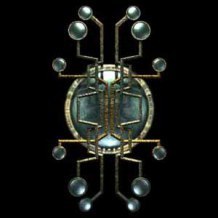 The ninth planet in the star system of Alkalurops, Ix is the home of the technocracy that is responsible for producing the vast majority of the Imperium's machinery. The name of the planet stems from the misinterpretation of the planet's designation in Roman numerals.
The ninth planet in the star system of Alkalurops, Ix is the home of the technocracy that is responsible for producing the vast majority of the Imperium's machinery. The name of the planet stems from the misinterpretation of the planet's designation in Roman numerals.
In the original six novels, we never did get a description of what Ix looks like or what really went on there. For reasons which may have a lot to do with the fact that they are technologists in a universe where technology is morally proscribed, the Ixians appear to be somewhat recluse. However, it was clear that they were responsible for creating the various technologies that were central to the plot.
In God Emperor of Dune, Leto II is found to be recording his thoughts using an illegal device that was manufactured by on Ix. It was also the Ixians who were responsible for breeding Malky, a man who's purpose was to influence Leto into doubting his own path and purpose. Hwi Noree, who was a sort of polar opposite to Malky, was also created to lure him with her charms. Both individuals were bred inside a "no-chamber", a special cell that hide what is within from prescient detection. This same technology would later go into created "no-ships" and even larger "no-fields" which could shield entire planets.
Another revelation which came in GED was the fact that Leto, through his Golden Path, had apparently prevented the Ixians from developing a breed of hunter-seekers which would have completely destroyed humanity. Ultimately, part of his plan was to encourage the development of certain technologies while preventing others. Whereas the hunter-seekers fell into the latter category, machines that could block prescience or replace it (i.e. the machine that could do the job of a navigator) fell into the former.
Kaitain: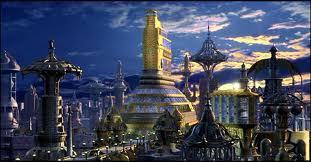 In the original Dune novel, Kaitain was the seat of power for the Padishah Emperor and the location of the Imperial Court. It was also the homeworld of House Corrino after events on Selusa Secundus forced them to move. All of the guilds, major houses and interests in the known universe maintained a presence here, including the Spacing Guild, the Bene Gesserit, the Ixians, the Tleilaxu, the Landsraad, CHOAM, etc.
In the original Dune novel, Kaitain was the seat of power for the Padishah Emperor and the location of the Imperial Court. It was also the homeworld of House Corrino after events on Selusa Secundus forced them to move. All of the guilds, major houses and interests in the known universe maintained a presence here, including the Spacing Guild, the Bene Gesserit, the Ixians, the Tleilaxu, the Landsraad, CHOAM, etc.
After events on Arrakis forced him to intervene, Emperor Shaddam IV relocated the royal palace to Arrakis so that he could oversee the deployment of his armies and ensure the Baron's cooperation.
Aside from that, not much is mentioned of Kaitain, except for a description of the Golden Lion throne in the original novel's appendices. Here, it is described as an opulent throne that had been "carved from a single piece of Hagal quartz — blue-green translucency shot through with streaks of yellow fire."
Selusa Secundus: Once the seat of House Corrino and the Royal Court, this planet became a prison world after it was devastated in a nuclear attack. As a result, the planet's climate is incredibly harsh and inhospitable, making it the perfect world for the condemned of society. Radiation from the attack still permeates the planet's climate, and mortality rates amongst prisoners are apparently as high as 60 percent.
Once the seat of House Corrino and the Royal Court, this planet became a prison world after it was devastated in a nuclear attack. As a result, the planet's climate is incredibly harsh and inhospitable, making it the perfect world for the condemned of society. Radiation from the attack still permeates the planet's climate, and mortality rates amongst prisoners are apparently as high as 60 percent.
However, as is quickly made clear in the first novel and throughout the series, Selusa Secundus also serves as the training grounds for the Emperor's dreaded Sardaukar army. This is done in secret, though most Houses within the Imperium apparently suspect it. In fact, in the first novel, the Emperor apparently became suspicious when Baron Harkonnen remarked to Count Fenrig that he would use Arrakis to conduct a similar experiment with his own armies. This was meant only in jest, but it did speak to suspicions the Emperor had.
One other person who understood this was Paul. After becoming an exile on Arrakis, he began to learn that his father had similar plans with the Fremen. By making an alliance with the Fremen, people who had been toughened by conditions worse than that on Selusa Secundus, his father would eventually be able to raise an army army that could rival the Sardaukar. Convinced that Paul was their messiah, he put this plan into action and was able to defeat the Emperor's armies outside of Arrakeen.
After seizing control of the Golden Lion Throne, Paul exiled House Corrino to Selusa Secundus where they remained until events in Children of Dune. It was here that Shaddam's third daughter, Princess Wensicia, began plotting the assassinate Paul's twin children and place her own son Farad'n on the throne. When Jessica is forced to flee Arrakis with Duncan, they found shelter here and made their deal with Winsicia. In exchange for marriage between Ghanima and Farad'n, she agreed to teach him in the Bene Gesserit ways.
Beyond that, no mention is made of Selusa Secundus. Much like House Corrino, it seemed this planet was destined to fade into obscurity.
Tleilax: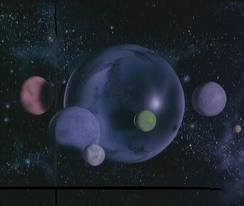 Yet another obscure world to come out of the Dune universe. And much like Ix, very little was said about this planet until late in the series. Nevertheless, it too played a very important role in the Dune universe and a number of key developments and inventions were apparently born here.
Yet another obscure world to come out of the Dune universe. And much like Ix, very little was said about this planet until late in the series. Nevertheless, it too played a very important role in the Dune universe and a number of key developments and inventions were apparently born here.
The sole planet in the Thalim star system, this world is also the home of the mysterious Bene Tleilax. In addition to being the training ground for "twisted Mentats", Tleilax is also the home of the elusive axlotl tanks, which are used in the production of gholas. Though most within the Imperium frowned upon these devices, as they did all Tleilaxu inventions, the tanks and gholas in particular were used by just about all factions for the sake of their plotting and machinations.
In Dune Messiah, much is told about the Tleilaxu due to their involvement in a plot to unseat Paul Mua'dib from the Imperial Throne. This included the creation of a Duncan Idaho ghola, which had been programmed to kill Paul once he uttered the key phrase "she's gone" in reference to his beloved Chani. However, this was soon revealed to be a plot within a plot, where the real intent was to show how the original memories of a ghola could be recovered by forcing them into a situation where their original self would reassert itself in order to fight against operate conditioning.
In God Emperor of Dune, Leto II is shown to be reliant on the Tleilaxu's axlotl technology because he keeps demanding gholas of Duncan Idaho. For reasons unknown, he insists on having the original Duncan in his court, with his full memory restored. It is later suggested that this was an important part of his breeding program, that Duncan contained a special gene which he needed to bread into his descendents. But whatever his reasons, the Bene Gesserit continued his program and maintained an alliance with the Tleilaxu whereby they would receive gholas of Duncan Idaho so they could try to ascertain his true purpose.
In Heretics of Dune, the sixth incarnation of the Sisterhood's Duncan Idaho is revealed to be special. Unlike the other incarnations, he has access to the memories of all other Idaho gholas, dating back to the very first who served Pual Mua'dib and all those who served and died at the hands of Leto II. In addition, the Tleilaxu clearly equipped him with the sex techniques of the Honored Matres so that he would be able to turn the tables on them when the time came, resisting their attempts to "imprint him" and imprint himself onto one of them. All of this leads Duncan to the conclusion that he now possesses Kwisatz Haderach-like abilities, which is confirmed in Chapterhouse: Dune when he begins to experience visions of the old man and lady (see below).
Also, in was in Heretics of Dune that readers got their first glimpse of the Tleilaxu homeworld and their society. Prior to this, it was understood that Tleilaxu was master geneticists who had engineered their own version of the Kwisatz Hadderach, but which had apparently committed suicide. It was also shown that they were ruled by a series of "masters"; Master Scytale being the one who participated in the plot in Dune Messiah. However, what was not revealed was that the Tleilaxu were actually secret Zensunni's and Sufi's who maintained strict religious secrecy so as to keep their plans hidden from "powindah" (aka. outsiders). In addition, all masters were clones (not gholas) of their original selves and achieved a sort of immortality this way. This was apparently part of their long-term plan to assert their dominance over the known universe, a plan which was finally hatched in Heretics of Dune and involved the specially-programmed Duncan Idaho ghola.
Also central to the plot of several novels in the original series was the Face Dancer, another invention unique to the Tleilaxu. These were people specially bred to be able to take on the likeness and even the memories of people they were charged with killing and impersonating. Bred to be eunuchs and completely loyal, they were human only in the strictest sense of the word and possessed no identity of their own. However, this changed as the series progressed and it became clear that after millenia of adopting the personas of others, Face Dancers were beginning to develop personalities of their own.
This was apparently the threat the Honored Matres were themselves fleeing and which had forced them back into the universe of the Old Imperium. Throughout Chapterhouse: Dune, Duncan Idaho is haunted by visions of an old man and a woman whom he identifies as free Face Dancers. It is these people who he concludes are responsible for the greater threat they face, and who appear to want to capture him because of his special abilities as well.
Another interesting invention to come out Tleilax was the "slig", a genetically engineered hybrid which crossed the DNA of a pig with a slug to produce a large, fleshy and slothful creature that is easily harvested for its meat. As was remarked in one of the later books in the series, this animal was considered ugly, even disgusting, due to its multiple mouths and skin that excreted a slimy and noxious residue. However, due to its sweet and terder meat, there were few in the Imperium who did not enjoy having "slig medallions" on their tables.
Final Thoughts:
Before I get into talk of patterns and conclusions, a little disclaimer first. First, there are plenty more worlds in Dune universe that are probably worth mentioning. However, there was no way to include them all without making either breaking this post in two or making it run on forever. Second, I deliberately left out information that did not come from the original six novels. True, there's plenty more mentioned in the expanded franchise of these and other worlds in the Dune universe, but I wanted to stick to material that Frank himself was known to have written. Anything that comes from the expanded universe is likely to suffer from original though. Funny way of putting I know, but it can be known to dilute or undercut anything the original author themselves established.
Okay! Now that I've covered my ass, let me get to what I think about these cool worlds! Well, a few things jumped out at me after I was finished researching this list and gave it a final glance:
1. Frank loved secret societies!: Whether it was the Fremen, the Bene Gesserit, the Bene Tleilax, the Ixians, or the Emperor, the concept of recluse worlds and secrets ran through Frank's original works like a vein. Clearly, he was a big (and I mean big, big, BIG!) fan of intrigue, secrecy, and societies that were founded on them. This is one of the things that I think made the Dune universe so readable and realistic in tone.
Regardless of their house or faction, it seemed that everybody was looking to get a leg up on someone else and found that the best way to do that was to conduct themselves in secret. Was this a commentary on humanity, the result of living under imperial rule, or the result of the complacency Paul and Leto hoped to rescue humanity from? Who knows, point is, he loved em! I think I smell another post in the wind…
2. Ecology effects people: As already mentioned, Frank paid a great of attention to the link between environments and culture. Whereas the Fremen and their values were clearly the result of their hostile and sparse world, the Atreides had apparently been rendered soft by generations of living on Caladan. House Harkonnen, with all their ugly desires and habits, boasted a world to match. And of course Selusa Secundus and Arrakis both served as the ideal training grounds for elite soldiers because life on both was just so freaking hard!
Well that's all for now. Stay tuned, I plan to tackle the Star Wars universe next! And more chapters for Data Miners are still on the way…








April 2, 2012
Data Miners – Chapter 1
 Hello! In anticipation for Data Miners release, I will posting chapters of the upcoming novel online for free over the next couple of days. As usual, I will be posting sample chapters over at my free ebook sites as well. So if you feel like downloading a larger text file, feel free to visit them. Otherwise, stay tuned and enjoy the first five chapters, free of charge and hot from my own personal printing press (by which I mean my laptop!) Look for the rest, coming soon, on Amazon.com and Barnes and Noble, or at Kindle and Nook for iPads, tablets and other devices.
Hello! In anticipation for Data Miners release, I will posting chapters of the upcoming novel online for free over the next couple of days. As usual, I will be posting sample chapters over at my free ebook sites as well. So if you feel like downloading a larger text file, feel free to visit them. Otherwise, stay tuned and enjoy the first five chapters, free of charge and hot from my own personal printing press (by which I mean my laptop!) Look for the rest, coming soon, on Amazon.com and Barnes and Noble, or at Kindle and Nook for iPads, tablets and other devices.
Epilogue:
"Yes, I am a criminal. My crime is that of curiosity. My crime is that of judging people by what they say and think, not what they look like. My crime is that of outsmarting you, something that you will never forgive me for… I am a hacker, and this is my manifesto. You may stop this individual, but you can't stop us all… after all, we're all alike."
-The Mentor, "The Conscience of a Hacker",
January 8, 1986
One
June 23rd, 2009
2:35 pm.
Yamal Pradchaphet eyes the preference line for what feels like the millionth time in the last few minutes. It's not an easy question and he needs to think it over for a minute or two. His right hand poised over the keys, his left scratching at the tuft of greasy hair hanging in his face. He looks to his right and spies the big pile of blank reports and worksheets next to his monitor. He'll be sure to get to those just as soon as he takes care of this little task.
"What kind of women do you want to meet?"
The undressing lady holds her pose after pushing her lace-covered chest outward. The gentle soprano that is her voice is still ringing in his ears. He dares not say Asian, or Filipino. That would limit his options greatly in the latter case, and he doesn't much trust the former. If he wants to meet girls his mother approves of, he might as well date the girls they keep suggesting for him. The old joke he used to tell his parents runs through his mind.
Mom, I bring home nice girls all the time. You don't need to.
Still, the woman is looking for an answer. Damn she's hot too. Why can't he just say he wants her? Her black lace underwear and shapely curves are something he could wear all day. Why doesn't she come with the service?
Because she's a fucking model you idiot, and those curves are digitally enhanced!
So many years and so many kilometres separating him and his heritage, and he still can't seem to screw up the courage to be honest, not without looking over his shoulder. He checks once more, then clicks on the boxes he really wants.
Blonde, Brunette, Redhead. And Caucasian just in case that's not clear enough. He looks at the other possibilities for a second too and selects Latina and Mediterranean. It's interesting how specific they can be, but preferences tend to be that way. Those were the women he truly fantasized about, the ones he thought of whenever… you know.
"What kind of relationship are you looking for?" the woman asks, and starts to undo the hook on her bra. Pradchaphet's breath goes shallow and he lowers the volume to one shade above mute. She's on the verge of exposing her tits, the straps dropping and exposing the slip of pale flesh above the nipples. He's never found the nerve to go this far at his desk in his place of work. But boredom and horniness are the fertilizers of impetuous acts. And right now he is really, really bored… and the rest.
He clicks once on discreet relationship and again on erotic chat/email, just for good measure. Please let this be the last step, he prays to any God that will listen, and hits Enter on his keyboard.
Her breasts are now bare. Prad is momentarily excited, then slightly disappointed. The fine, pink globes and the tiny brown nipples just don't seem so thrilling now that they are out. Perhaps it was a buildup. Still, he's not going to count his chickens until he sees her totally in the buff.
"What's your name?" she asks, undoing her short skirt. The panties match the bra, black, thin and lacy, showing just enough skin around the most sensitive areas. But alas, a name for his account… He really didn't give that one any thought until now. It's important not to use his Society name, the one his friends see whenever privileged emails are sent. Lucky he has a family name that translates so well when it comes to internet handles.
PradChap. No one ever uses that name. The numbers aren't even really necessary, just a way to meet the minimum field requirement of seven figures.
He hits Enter again and holds his breath.
The woman disappears. Her almost naked body vanishes into the thin air of cyberspace while somewhere, a computer processes his application. Damn you vile temptress, he thinks as he waits for the list of possible hook ups to appear. Sure enough, they do, a new focus for his sexual frustrations. The title line says it all.
Women In Your Area Looking for Fun and Casual Hook-ups.
He scans through the long list of grainy pics, nothing like the ones used to lure him in while he was cruising the torrent sites, looking for downloads. Already he's losing interest in the whole process. Playmates just isn't living up to its name just yet. He looks at the clock in the lower right hand corner of his screen. The thought of cruising some free sites suddenly seems much more appealing. At the very least it would kill some time before he finally has to punch out.
He calls up the Candylist directory and starts right clicking on the sites he wants from the long list that Candy, the site's hot little avatar that dances in the upper right corner, has graciously provided him with.
Busty, Teens, and what the hell, Asians.
***
3:15 pm.
The coffee has turned stale and is just hot enough to melt the three sugar cubes that are needed to mask the awful taste. Coffee mate is available, but something about the powdered shit makes him uneasy. He decides to raid the fridge, see if there is any fresh milk or cream in there. An opened carton of half-and-half is all he can find.
"Don't let Miriam catch you with that."
Prad recognizes the voice. It's Rohit, his only real companion in this jungle of steel and concrete, at least the only one he truly thinks of as a friend. He eyes the container and assumes the obvious.
"It hers?"
"Yep, and she's not one for sharing."
"How would she know?" Prad says. "As if there aren't enough people crammed into this floor as it is."
"Yeah, I suppose. What are you working on?"
"Fucking the dog," Prad says, giving his coffee a stir and sip. His appraisal of the taste comes through in a big wide grimace. Too sweet, and kind of burnt, like honey on blackened toast. Rohit gives him a nervous look.
"Uh-oh, I know what that means."
"It's not like you spend every hour at your desk working," Prad reminds him.
"No, but Tetris and Minesweeper aren't considered offensive. You know they're short-listing people for the downsizing list. Quickest way to get on that list is to commit a sex offence."
"Like flash my junk at the software chick with the big tits?"
Rohit takes a sip from his own mug of stale coffee and looks at the break room door. He shoots Prad a look that says "watch it!" Even joking about that sort of thing is a no-no in the workplace nowadays. Prad rolls his eyes and tries to absorb the moral. He will be sure to lower his voice when making such comments again.
"Alright, I get the point," he concedes. "So you have an idea who's on that list?"
"Oh, you know, same old. Temps, part-timers, and a few old people who they figure they can kick out with some severance and not have to worry about promoting. And I hear there's a couple who are finally getting the boot because of complaints filed against them."
Please be O'Malley, Prad thinks. The old prig is a constant fucking pain, disliked by the ladies and the younger gents alike, especially the ones he refers to as the "ethnic ones". He isn't the only one Prad would be happy to say goodbye to, but based on Rohit's criteria, he seems the most deserving.
"So how much time do you figure we have here?"
"We?" Rohit says incredulously. The idea that Prad would speak about them in the same sentence is clearly a shock. "Not sure how much time I got. Job security isn't exactly a solid commodity around here right now."
Prad scoffs. "Big execs always use that 'bad economy' shit to justify firing people."
"Doesn't make any difference to us though does it? Laid off is laid off."
Prad nods, conceding the point. "So how much time do you figure?"
"Me, I'm guessing us baseline programmers got about six months before they start streamlining us."
"Christmas? You think they'd lay people off before the holidays?"
"Easier than waiting til after to do it. Plus you get to spend the severance on presents and booze, helps numb the pain."
"Still cold, man."
"Anyway, I don't think I'll be getting a pink slip during the first round."
"What about me?"
Rohit takes another sip and looks to be running Prad's prospects in his mind. One thing programmers were good at was statistical analysis, which also made them adept gamblers. Not that Rohit could ever be tempted into doing any. He was boring like that…
"Well," he finally says with a shrug. "I'm sure you could look forward to a big, fat holiday severance."
"Woohoo…" Prad raises his hand in a mock victory salute. "At least I can look forward to sleeping in, and not working for people way stupider than me."
Rohit looks at the break room doorway again.
"Dude, you need to shut up."
***
6:30pm.
Prad is home from work in the Empire State Towers, apartment fourteen-eleven, which is a one bedroom suite. In point of fact, it's floor thirteen, but due to the superstitious nature of most builders, floor thirteen does not exist. The view provides a lovely view of the skyline. At present, a beautiful orange hue is settling over the city, due in part to humidity, engine emissions and the fact that a stiff sea breeze hasn't rolled in in recent days. Prad loves the colors, but would enjoy another transfusion of ocean air soon. The smell of smog reminds him too much of visiting family overseas.
A takeout box of fried Singapore noodles sits next to the keyboard. A few splotches of sauce decorate his shirt, but none had reached the keyboard thanks to his chopstick handling skills. The television plays in the background. It's six o'clock so there's nothing on except for the news. Scarcely anything that deserves attention, just more fear and controversy, people dying in the Middle East, murder and mayhem here at home. Rummaging through Shoutwire is so much more interesting. There are two stories that occupy his attention at the moment. One is a recent study conducted in France that is making waves, linking crime rates to ethnicity. Apparently, the researcher contends that people of Muslim backgrounds, specifically Algerians and Moroccans are more likely to commit crimes. He can bear reading about this study for only a few minutes before losing his cool and starts leaving harsh comments.
Everybody knows the French want to ban Muslim immigration! This study is propaganda and nothing more. Quit pretending like this is an issue!
The other is summed up by its title, "Facebook linked to rise in Syphilis". He has to admit, the link is tenuous, but makes for much more interesting reading.
Some news hits the screen that catches his attention, both ears tuning in. A special interest story concerning a person whose name he recognizes. He hasn't heard it in awhile, but he's certainly no stranger to national news. His fame was one of the reasons Prad was proud to know Professor Germaine of MIT, a big name in the wireless world. Prad had read about it already on all the webnews sites for days now; the mainstream media is only now getting around to talking about it. The once proud and eccentric teacher of Data Systems Analysis at MIT is under the weather and not long for this world, the perky Asian reporter, Hillary Qin, is saying. The investigative report takes the usual circuitous route to tell him this, going back over his life for those who did not have the benefit of knowing him.
"Albert Germaine was a gifted student who excelled in the maths and sciences. From an early age, he was fascinated with computers and data systems. In his teen years, when most boys his age were interested in cars and going to drive-in movies, Professor Germaine was at work loading punch cards into his IBM or reading up on Alan Turing. In 1978, he was accepted into the Massachusetts Institute of Technology where he furthered his studies in computer science, with a double minor in linguistics and behavioural psychology. His doctoral thesis, entitled "The Turing Test from a Behavioural Perspective", argued that machines, in time, would be capable of imitating basic human thought and behaviour. His thesis drew on many seminal thinkers of his time, from Wittgenstein and Ryle to B.F. Skinner and John B. Watson. Arguing that the human brain, in its most basic form, is essentially a series of program instructions which are formed in accordance with conditioning and experience (similar to computer algorithms) he believed that a sufficiently advanced data system would be capable of independent thought and reason. In addition to behavioural psychologists, he also drew on noted authors, such as Philip K. Dick and Arthur Koestler, to make his point. The human brain, he argued, had evolved to meet the challenges of life through adaptive hardware and tailored software. Language, reasoning, routines, even philosophy could be broken down into programming language. This sort of language, rendered in digital form, could give a machine the same capabilities.
"After a five year stint as a researcher with a private laboratory, Germaine returned to MIT where he divided his time between teaching and advancing his research. Convinced that Alan Turning's theories could be proven, he began using CT scans to map the brains of volunteers. As would later be learned, he performed many scans on himself as well. Once he had a sufficient idea of what specific human neural patterns looked like, he ventured, he would be able to design a synthetic version. For years, his work would attract scorn and controversy from theorists and the general public who accused him of practising a sort of technological Fascism. Some went so far as to compare him with Nazi researchers who performed cruel tests on human subjects. Others claimed that his ideas and research sought to deprive the human mind of its mystery and sacred value…
Prad had to tune out at this point, as he is already intimately familiar with most of the details of the professor's history. Any student of data systems analysis at MIT knew about the professor. Anyone who was anyone in the programming world knew the name by reputation. They all knew exactly how he viewed all that hubbub as well, so Prad didn't need to hear it from Qin. Germaine was as myopic as he was fucking brilliant; he believed those who didn't understand or agree with him were small-minded or blind to simple realities. He had little time for what he called "mind-body dualistic nonsense", just as he had little time for Christians and other religious people. Many of his students dropped or boycotted his courses because of this. The campus' Christian Coalition smeared him with pamphlets and seminars and petitioned the university to fire him. Eventually, they got their way. Prad smiled when he heard Qin addressing this next. It was as if they had a direct line to his brain and he were the one giving the report:
"In 1996, Germaine was diagnosed with Asperger's syndrome, a condition which had been misdiagnosed in his youth. Like many of his generation, he grew up with various labels, some saying that he was a genius, others that he was intellectually disabled. Germaine worked through and around these labels, and succeeded in spite of them, only to find out in his later years that his gifts and flaws were due to a common neurological disorder. As if this wasn't enough, MIT chose to end Germaine's tenure due to the controversy his work attracted. Professor Germaine retreated into isolation for a time, reappearing only on occasion as a guest lecturer at symposiums or seminars. In time, however, a movement arose to restore the professor to his former glory. A number of organizations and some of his former students, many of whom had risen to positions of prominence in the scientific world, agreed to mount a class-action discrimination lawsuit against MIT for their release of professor Germaine. The suit never made it to court, as the Institute chose instead to reinstate the professor and allow him to continue his work. Germaine returned in the fall of 2000."
And in 2000-2001 (or was it 2001-2002? He couldn't remember which year it was), Prad had met him. Angie was a student of his as well, though she and Prad had not known each other until after they had finished their degrees. It was kind of a bragging rights thing, knowing a man like Germaine. Most people in the Society did not, something that gave Angie and him some additional prestige, but everyone knew enough about him that it didn't really matter. Just about all of them had read Turing, the book he wrote on his seminal mentor, or some of his later published articles. There was also the study he wrote on the next great leap, entitled "Our Silicate Future". Most agreed that the man talked like he wrote anyway, one was as good as the next.
In any case, now the professor was on death's door, diagnosed with an inoperable brain tumour. He was sure some assholes in the media would say it was because of all those brain scans, but what the hell did they know? The Christian students unions would be celebrating for sure as well, even going as far to say that it was God's punishment for his arrogance. God liked to punish people who tried to tear the veil of mystery away from his creations, apparently. He was full of love, but if provoked, would get very nasty, like an abusive dad. Who knew God was such a good imitator of human behaviour? He looked up some recent articles on CNN.com and from The Boston Globe that mentioned where he was and how he was doing. He was still working, they said. Brave soul, with only a few months left at the outside, but he was carrying on. The pictures showed him smiling bravely and being helped around by some students in their white coats. Prad felt a tinge of jealousy. The honour of helping the man complete his work was something only the truly skilled should be doing. Someone like him, in other words.
Maybe when I get fired, he ventures.
The television moves onto more boring matters, crime and death in the nation. Off it goes, and his full attention is back on his computer (or Dorothy, as he knows her). A little first-person shooter feels right about now, or maybe some time with the blogosphere. But then there's the matter of his inbox which has a few new messages he hasn't checked yet. He decides to check these before doing anything else. There's one for discount boner pills, one for vitamins from the General Health Store, and one for an online dating service. He shakes his head mournfully before deleting them all. No matter how many spyware and adware zappers he installs on his machine, his surfing habits still end up in a database somewhere, prompting hordes of unwanted spam. But at least the dating service offer has reminded him that he needs to check on his account with Playmates. Despite getting bored with it earlier, he wants to see who might have earmarked him in the Playmates system, see if any of them have more attractive profiles.
Then he notices the email from the Society, the subject line saying "Meeting." He quickly opens this one and scans the first few lines of text. Angela's signature is at the bottom, her DeeMark as they refer to it. She's advising him that their chapter has received a challenge, a test of their mettle from the local DeePs. Angie's never one to turn down a challenge; as a matter of honour, she can't abide trash talk from those bloody pirates! As a result, she is writing to tell them that their next meeting, scheduled for Tuesday, won't be the normal online meet and greet. This time, it will involve a mission, and a rather lucrative one at that. The nature of it is too sensitive to talk about here, she says. It will have to be conveyed in person.
The time and the place are written in code one line above her signature.
SCH, D-1, XVIII H-H.
Well that settles things for the evening. Tomorrow he can look forward to his date with Angela, and whichever other Society guests are in attendance. Tonight, he has a few programs to watch but needs to eat and kill a few hours before that can happen. He fetches his jacket and keys and decides to head for the pub.
***
8:30pm (or thereabouts).
The killing field stares back at him. The baked bones and greasy guts are strewn about in a semicircular pile, forced to share space with a defiling mass of crumpled litter. Prad wonders just how many animals died in this particular holocaust. Their limbs torn from their bodies, blood gushing and bringing their steroid pumped, cage ridden, grain-fed existence to a slow, agonizing halt. Born on a death farm, forced to wander around on broken legs, then cut down in their prime to feed the hungry barons of the inner city. Just like those poor calves in their plastic cages, senseless and isolated until the day when a patron looking to serve up veal parmesan or scaloppini puts the wheels in motion whereby their horrible existence is mercifully ended. Prad thinks it all over and considers becoming vegetarian until his order of potato skins arrive and he realizes the bacon bits are the best part.
He orders another Sapporo and resolves to give the subject some more thought before making any decision on the matter. Never hurts to drown a moral decision in endless debate. The cute underage waitress smiles at him mechanically and takes the plate of bones away. He knows he's too messy and bloated to flirt or be of genuine appeal to her, so he resolves to behave himself and not be that asshole who is low enough to flirt with bar staff, or stupid enough to think they are taking him seriously.
Just another Thursday night, and he's bored, restless, kind of drunk, and aching to go on vacation. He doesn't have to drive home and he could find his way back to his flat blindfolded and half-dead. The potato skins looks good, but he knows they'd be better with a little added cheer. He makes a beeline for the men's room and finds a stall where he can sit alone and pop the little something he slipped into his pocket back at his flat. The tap water has a chemical taste and is way too cold, but he only needs an ounce or two to wash down the jagged pill. He takes a deep breath and looks at himself in the mirror. In a few minutes, his night will become a hell of a lot more interesting.








March 31, 2012
Dystopia – Final Word
Well, after many, many suggestions on how my list of dystopian franchises could be augmented – this mainly consisted of poeple asking me "what about (blank)?" – I decided there were a few that I really couldn't proceed without mentioning. This will be my last tour of the dystopia factory, lord knows that place gets depressing after awhile! But one thing at a time. Here's my final installment in dystopian science fiction series, a hybrid list of novels, graphic novels, and movies!
A Clockwork Orange: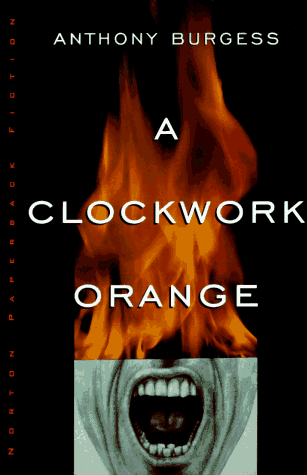 This dystopian novella was originally written in 1962 and was adapted into film by the great Kubrick almost a decade later. In addition, it was adapted into play after the author realized he didn't like how the adapted movie ended. Having experienced all three, I can tell you that the movie was probably the best. In addition to the rather ingenious ideas presented by Anthony Burgess, it also benefited from Kubrick's directorial genius and the superb acting of Malcolm McDowell.
This dystopian novella was originally written in 1962 and was adapted into film by the great Kubrick almost a decade later. In addition, it was adapted into play after the author realized he didn't like how the adapted movie ended. Having experienced all three, I can tell you that the movie was probably the best. In addition to the rather ingenious ideas presented by Anthony Burgess, it also benefited from Kubrick's directorial genius and the superb acting of Malcolm McDowell.
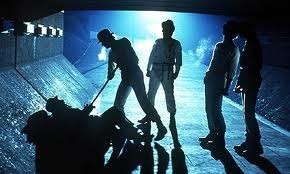 Set in the not-too-distant future, the story revolves around a British youth named Alex who is growing up in a world permeated by youth violence. He is the leader of a group of thugs known as "The Droogs", young men who go about committing acts of "ultra-violence" which consists of them beating up homeless people, other gangs, and gang rape. In time, Alex is betrayed by his mates and subjected to a government experiment – an artificially created conscience through Pavlovian conditioning!
Set in the not-too-distant future, the story revolves around a British youth named Alex who is growing up in a world permeated by youth violence. He is the leader of a group of thugs known as "The Droogs", young men who go about committing acts of "ultra-violence" which consists of them beating up homeless people, other gangs, and gang rape. In time, Alex is betrayed by his mates and subjected to a government experiment – an artificially created conscience through Pavlovian conditioning!
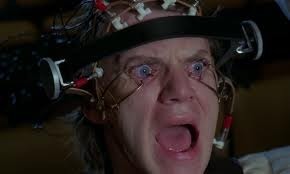 Ultimately, the movie differed from the novel in that the final chapter was omitted. Immediately before this, we see how Alex is recovering in bed, realizes the conditioning has worn off, and is about to betray the government. However, the chapter following shows how Alex has realized, independently, that he doesn't want to live a life of violence anymore. Human freedom, he's determined, is the ability to make choices for oneself, free of persuasion and operate conditioning.
Ultimately, the movie differed from the novel in that the final chapter was omitted. Immediately before this, we see how Alex is recovering in bed, realizes the conditioning has worn off, and is about to betray the government. However, the chapter following shows how Alex has realized, independently, that he doesn't want to live a life of violence anymore. Human freedom, he's determined, is the ability to make choices for oneself, free of persuasion and operate conditioning.
As I said, I truly think the movie was an improvement on the novel, which is a rare thing with adaptations. Still, it is was in the film that the point of the story really came through, thanks to Kubrick's usual attention to detail and subtlety. Whether it was through those long, close-up shots of McDowell and his crazy eyes, the combination of wide angle action shots in slow motion, or the way that it played to the tune of Beethoven, you really got a sense of the odd combination of genius and madness that is the anti-hero Alex. The reliance on white, sterile settings also helped to punctuate the sociopathic nature of the story – how underneath the veneer of domesticity, brutality and violence can exist!
A Scanner Darkly: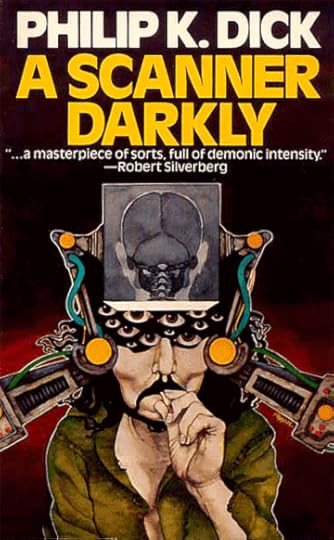 Next up, we have Philip K Dicks seminal novel about drug abuse, self-destruction and the various hypocrisies arising out of America's war on drugs. In this near-future scenario, which takes place in California in 1994 (seventeen years after it was written), a new drug has hit the streets known as Substance D – or SD, which stands for Slow Death. This powerful hallucinogenic is a great high, is violently addictive, and can render users brain damaged after too much use and abuse. And as a result of its popularity and impact, society is gradually becoming a full-blown police state, where cameras – or "Scanners" – are on every street corner and in the home of every suspected dealer.
Next up, we have Philip K Dicks seminal novel about drug abuse, self-destruction and the various hypocrisies arising out of America's war on drugs. In this near-future scenario, which takes place in California in 1994 (seventeen years after it was written), a new drug has hit the streets known as Substance D – or SD, which stands for Slow Death. This powerful hallucinogenic is a great high, is violently addictive, and can render users brain damaged after too much use and abuse. And as a result of its popularity and impact, society is gradually becoming a full-blown police state, where cameras – or "Scanners" – are on every street corner and in the home of every suspected dealer.
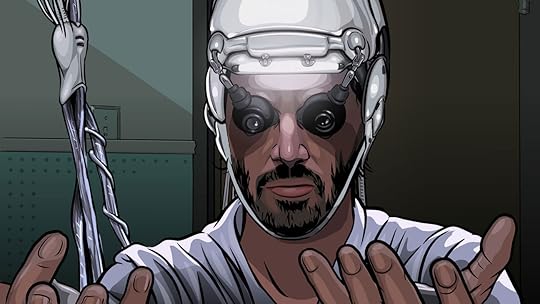 Written from the point of view of an undercover narcotics agent, the story follows his descent into addiction and his eventual inability to tell reality from fantasy. Through repeated use of Substance D, he gradually becomes brain damaged himself, is released from the police department, and must go to a privately run recovery-center known as "New-Path". There, he discovers that these centers, which operate like franchises, are actually growing the plant that Substance D is synthesized from. An interesting twist in which we learn that the people profiting from the side effects are the one's providing the drugs. A stab at strong-arm governments or the pharmaceuticals industry, perhaps?
Written from the point of view of an undercover narcotics agent, the story follows his descent into addiction and his eventual inability to tell reality from fantasy. Through repeated use of Substance D, he gradually becomes brain damaged himself, is released from the police department, and must go to a privately run recovery-center known as "New-Path". There, he discovers that these centers, which operate like franchises, are actually growing the plant that Substance D is synthesized from. An interesting twist in which we learn that the people profiting from the side effects are the one's providing the drugs. A stab at strong-arm governments or the pharmaceuticals industry, perhaps?
For the sake of adapting the movie to film, director Richard Linklater shot the entire thing digitally and then had it animated through the use of interpolated rotoscope. The effect of this was to render every single image in a vivid, almost cartoon-like format, which could only be interpreted as an attempt to mimic the effects of hallucinogens. This animation also came in handy with the rendering of the "scramble suit", a sort of cloak-like device that PKD invented to ensure that undercover agents in his story could completely disguise their appearance, voice, and any other identifying characteristics.
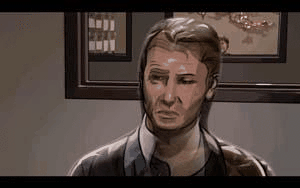 In addition to being science fiction genius, these cloaks were a clear allegory to the anonymity of undercover agents and a faceless system of justice. While responsible for infiltrating and busting up the narcotics subculture, PKD clearly understood that this sort of profession can lead to an identity crisis, especially if the agents in question find themselves using drugs and becoming over-sympathetic to the people they are spying on. This, of course, is precisely what happens to the main character in the story!
In addition to being science fiction genius, these cloaks were a clear allegory to the anonymity of undercover agents and a faceless system of justice. While responsible for infiltrating and busting up the narcotics subculture, PKD clearly understood that this sort of profession can lead to an identity crisis, especially if the agents in question find themselves using drugs and becoming over-sympathetic to the people they are spying on. This, of course, is precisely what happens to the main character in the story!
In short, the novel was a commentary on the dangers of recreational drug use, but also on the reasons for why such subcultures come into existence in the first place. In addition to ruining lives and causing crime, repression, domestic surveillance, and other extra-legal practices can become quite commonplace. All of this mirrored PKD's own experiences with the drug subculture and the law, which is why he dedicated the book to all the friends he had who succumbed to drug abuse and died as a result. Very sad!
And let's not forget the name, a play on the words from the Biblical passage, 1 Corinthians 13:12 : "Through a mirror darkly." In this day and age, where "scanners" are the means for monitoring society and police officers spend hours looking at their feeds, the scanner has become a sort of means through which people attempt to gaze into other peoples' souls. But, as with the Biblical passage, this title is meant to refer to how, when we look at the problems of drug use in our society, we are seeing it all through a haze, the result of our own prejudices and preconceptions.
Akira: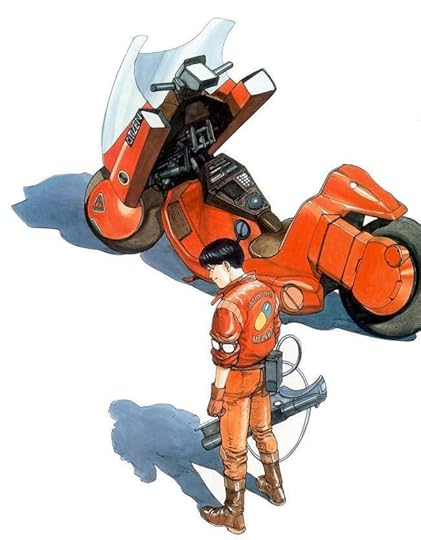 How the hell did I forget this one last time? I mean seriously, this is one of my favorite movies and one of the most inspired Mangas of all time! Not only that, it's a pretty good example of a dystopian franchise. And yet, I forgot it! WHAT THE HELL WAS I THINKING?! But enough self-flagellation, I came here to talk about Akira! So, here goes…
How the hell did I forget this one last time? I mean seriously, this is one of my favorite movies and one of the most inspired Mangas of all time! Not only that, it's a pretty good example of a dystopian franchise. And yet, I forgot it! WHAT THE HELL WAS I THINKING?! But enough self-flagellation, I came here to talk about Akira! So, here goes…
In 1988, famed Japanese writer, director and comic book creator Katsuhiro Otomo undertook the rather monumental task of adapting his Manga series Akira to the big screen. Though some predicted that a two hour movie could never do justice to the six-volume series he had written, most fans were pretty pleased with the end product. And the critical response was quite favorable as well, with the film being credited for its intense visualizations, cyberpunk theme, its post-apocalyptic feel, and the exploration of some rather heavy existential questions.
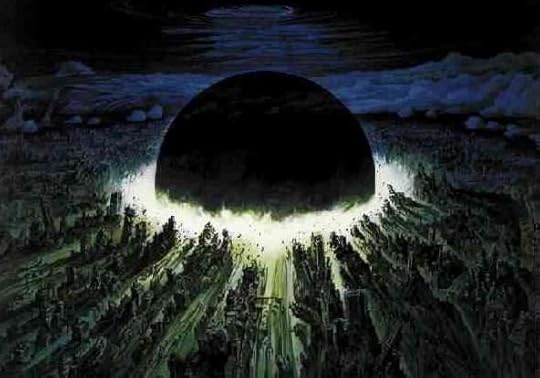 To break it down succinctly, Akira takes place in Neo-Tokyo, a massive urban center that was literally build up from the ruins of the original. According to the story's background, WWIII took place in 1989, and after twenty years of rebuilding, the world once again appears to be one the brink. However, as we come to learn, the destruction of Tokyo was not the result of the nuclear holocaust per se. It's destruction merely heralded it in after the world witnessed the city's obliteration, assumed it to have been the result of a nuclear attack, and starting shooting their missiles at each other. The real cause was a phenomena known as "Akira", an evolutionary leap that scientists had been studying and lost control of…
To break it down succinctly, Akira takes place in Neo-Tokyo, a massive urban center that was literally build up from the ruins of the original. According to the story's background, WWIII took place in 1989, and after twenty years of rebuilding, the world once again appears to be one the brink. However, as we come to learn, the destruction of Tokyo was not the result of the nuclear holocaust per se. It's destruction merely heralded it in after the world witnessed the city's obliteration, assumed it to have been the result of a nuclear attack, and starting shooting their missiles at each other. The real cause was a phenomena known as "Akira", an evolutionary leap that scientists had been studying and lost control of…
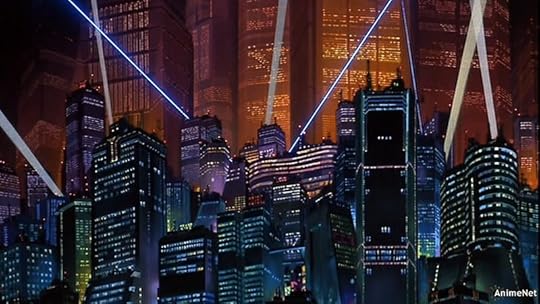 Quite the story, but what I loved most about the adapted movie and the manga on which it was based was the level of detail. Set in 2019 (the same year as Blade Runner, coincidentally!) this series incorporated a lot of concepts which made for a far more intricate and interesting tale. First off, there's the concept of a post-apocalyptic generation that is filled with unrest and angst, having grown up in a world permeated by the horrors of nuclear war. Second, there's the ever-present element of gang warfare that has sprung up amidst the social decay. Third, there's a government slouching towards dictatorship in response to all the protests, unrest and chaos that is consuming the city.
Quite the story, but what I loved most about the adapted movie and the manga on which it was based was the level of detail. Set in 2019 (the same year as Blade Runner, coincidentally!) this series incorporated a lot of concepts which made for a far more intricate and interesting tale. First off, there's the concept of a post-apocalyptic generation that is filled with unrest and angst, having grown up in a world permeated by the horrors of nuclear war. Second, there's the ever-present element of gang warfare that has sprung up amidst the social decay. Third, there's a government slouching towards dictatorship in response to all the protests, unrest and chaos that is consuming the city.
Into all this, you get a secret military project in which the Akira phenomena is once again being studied. Though motivated by a desire to control it and prevent what happened last time from happening again, it seems that history is destined to repeat itself. Once again, the survivors must crawl from the wreckage and rebuild, their only hope being that somehow, they will get it right next time… A genuine dystopian commentary if ever I heard one!
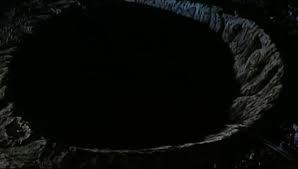 But what was also so awesome about the series, at least to me, was the underlying sense of realism and tension. You really got the sense that Otomo was tapping into the Zeitgeist with this one, relating how after decades of rebuilding through hard work and conformity, Japan was on the verge of some kind of social transformation. Much like in real life, the characters of the story have been through a nuclear holocaust and have had to crawl their way back from the brink, and a sense of "awakening" is one everybody's lips and they are just waiting for it to manifest.
But what was also so awesome about the series, at least to me, was the underlying sense of realism and tension. You really got the sense that Otomo was tapping into the Zeitgeist with this one, relating how after decades of rebuilding through hard work and conformity, Japan was on the verge of some kind of social transformation. Much like in real life, the characters of the story have been through a nuclear holocaust and have had to crawl their way back from the brink, and a sense of "awakening" is one everybody's lips and they are just waiting for it to manifest.
A clear allusion to post-war Japan where the country had been bombed to cinders and was left shattered and confused! Not to the mention the post-war sense of uniformity where politicians, corporations and Zaibatsu did their best to repress the youth movements and demands for social reform. Well, that was my impression at any rate, others have their own. But that's another thing that worked so well about Akira. It is multi- layered and highly abstract, relying on background, visuals and settings to tell the story rather than mere dialogue. In many ways, it calls to mind such classics as 2001, Clockwork Orange, and other Kubrick masterpieces.
Children of Men: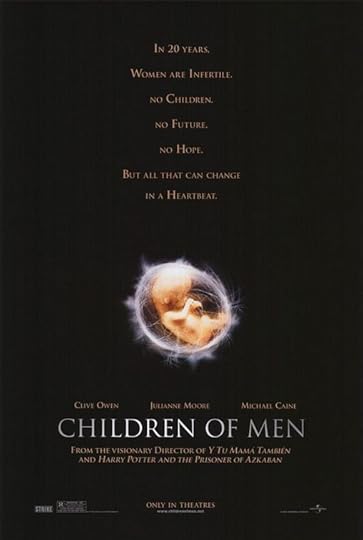 Made famous by the 2006 adaptation starring Clive Owen, this dystopian science fiction story was originally written by author P.D. James in 1992. The movie was only loosely based on the original text, but most of the particulars remained the same. Set in Britain during the early 21st century, the story takes place in a world where several subsequent generations have suffered from infertility and population growth has dropped down to zero. The current generation, the last to be born, are known as "Omegas" and are a lost people.
Made famous by the 2006 adaptation starring Clive Owen, this dystopian science fiction story was originally written by author P.D. James in 1992. The movie was only loosely based on the original text, but most of the particulars remained the same. Set in Britain during the early 21st century, the story takes place in a world where several subsequent generations have suffered from infertility and population growth has dropped down to zero. The current generation, the last to be born, are known as "Omegas" and are a lost people.
What's more, the growing chaos of the outside world has also led to the creation of a dictatorial government at home. This is due largely to the fact that people have lost all interest in politics, but also because the outside world has become chaotic due to the infertility crisis. Much like in V for Vendetta, the concept of "Lifeboat Britain" makes an appearance in this story and acts as one of the main driving forces for the plot.
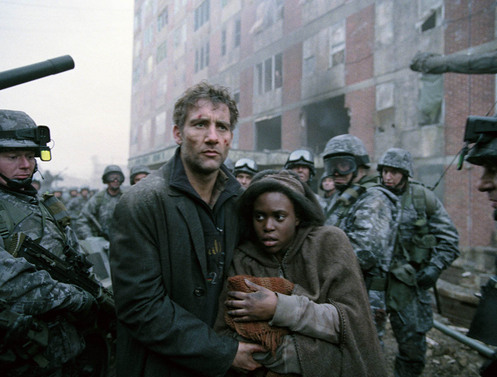 In any case, this also leads to the birth of a resistance which wants to end the governments tyrannical control over society, and which comes to involve the main character and his closest friends. In time, the plot comes to revolve around a single woman who is apparently pregnant. Whereas some of the rebels want to smuggle her out of Britain and hand her over to the international Human Project, others want to use her as a pawn in their war against the government. It thus falls to the main character to smuggle her out, protecting her from resistance fighters and the military alike.
In any case, this also leads to the birth of a resistance which wants to end the governments tyrannical control over society, and which comes to involve the main character and his closest friends. In time, the plot comes to revolve around a single woman who is apparently pregnant. Whereas some of the rebels want to smuggle her out of Britain and hand her over to the international Human Project, others want to use her as a pawn in their war against the government. It thus falls to the main character to smuggle her out, protecting her from resistance fighters and the military alike.
Naturally, the movie drew on all the novels strongest points, showing how society had effectively decayed once childbirth effectively ended. It also portrayed the consequences of impending extinction very well – chaos, withdrawal, tyranny, etc. However, when it came time to adapt it to the screen, Mexican film director Alfonso Cuaron (who brought us such hits as A Little Princess, Y Tu Mama Tambien, and Harry Potter and the Prisoner of Azkaban), also used a variety of visual techniques and sets to convey the right mood.
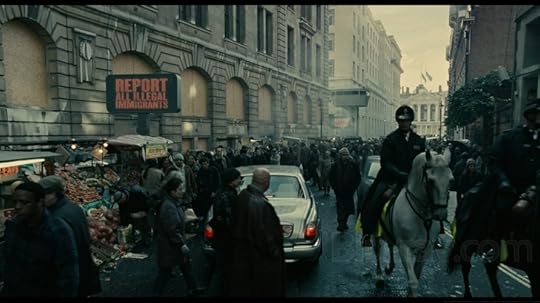 For example, most of the sets were designed to look like near-future versions of today. In Cuaron's estimation, all technological progress would have ceased once the implications of the crisis had fully hit, hence all cars, structures, weapons and gadgets were only slightly altered, or used sans modification. So while the billboards, newspapers and signs were all updated and carried messages appropriate for the period, cars, guns and other assorted background pieces looked entirely familiar.
For example, most of the sets were designed to look like near-future versions of today. In Cuaron's estimation, all technological progress would have ceased once the implications of the crisis had fully hit, hence all cars, structures, weapons and gadgets were only slightly altered, or used sans modification. So while the billboards, newspapers and signs were all updated and carried messages appropriate for the period, cars, guns and other assorted background pieces looked entirely familiar.
In addition, much of the movie is shot in such a way so that the images are grey and the light effect seems piercing. This conveys a general mood of drab sadness, which is very accurate considering the setting! Last, Cuaron and his camera crews made many continuous action shots using wide angle lenses in order to capture a sense of crisis and how it effected so many people. Never was there a sequence in which you only saw the main actors and their immediate surroundings. The focus, like the scope of the story, was big and far-reaching.
Ghost in the Shell: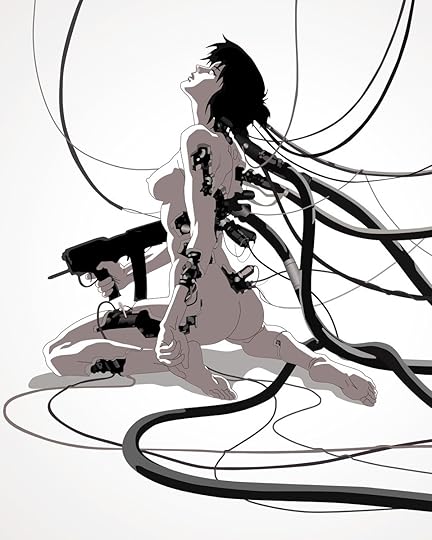 Much like Akira, this franchise comes to us by way of Japan and is cyberpunk-themed. In addition, it also came in the form of a manga, then onto a film, but with a television series to follow. And in many respects, it qualifies as dystopian, given that it took place in a dark future where technology has forever blurred the line between what is real and what is artificial. In addition, it also tapped into several cyberpunk trends which would prove to be quite apt (i.e. cyberspace).
Much like Akira, this franchise comes to us by way of Japan and is cyberpunk-themed. In addition, it also came in the form of a manga, then onto a film, but with a television series to follow. And in many respects, it qualifies as dystopian, given that it took place in a dark future where technology has forever blurred the line between what is real and what is artificial. In addition, it also tapped into several cyberpunk trends which would prove to be quite apt (i.e. cyberspace).
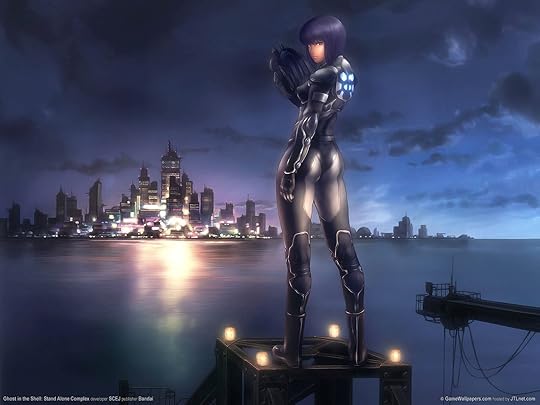 Again, this story takes place in Japan in the early 21st century, a time when cybernetic enhancements and technological progress have seriously altered society. The main character is named Motoko Kusanagi, a member of a covert operations division of the Japanese National Public Safety Commission known as Section 9. She is affectionately known as "Major" given her previous position with the Japanese Self-Defense Forces. And did I mention she's a cyborg? Yes, aside from her brain and parts of her spinal cord, she is almost entirely machine, and this plays into the story quite often.
Again, this story takes place in Japan in the early 21st century, a time when cybernetic enhancements and technological progress have seriously altered society. The main character is named Motoko Kusanagi, a member of a covert operations division of the Japanese National Public Safety Commission known as Section 9. She is affectionately known as "Major" given her previous position with the Japanese Self-Defense Forces. And did I mention she's a cyborg? Yes, aside from her brain and parts of her spinal cord, she is almost entirely machine, and this plays into the story quite often.
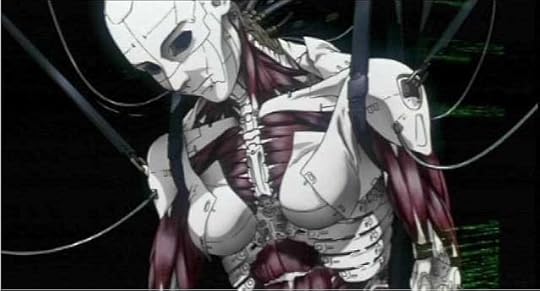 In addition to facing external threats, Kusanagi and her companions also face conflicts that arise out of their own nature. These deal largely with issues relating to their own humanity, whether or not a person and their memories can even be considered real anymore if they have been replaced by digital or cybernetic enhancements. These questions were explored in depth in the movie, where events revolve around a sentient program that was developed by the government, but which has since gone rogue and is seeking an independent existence.
In addition to facing external threats, Kusanagi and her companions also face conflicts that arise out of their own nature. These deal largely with issues relating to their own humanity, whether or not a person and their memories can even be considered real anymore if they have been replaced by digital or cybernetic enhancements. These questions were explored in depth in the movie, where events revolve around a sentient program that was developed by the government, but which has since gone rogue and is seeking an independent existence.
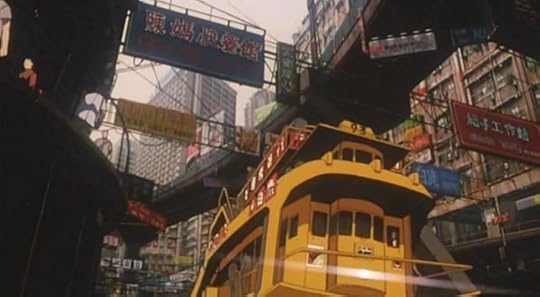 However, another thing that makes Ghost in the Shell a possible candidate for the category of dystopia is the setting. Whether it was the manga, the movie, or the television series, the look and feel of the world in which it takes place is quite telling. Always there is a dirty, gritty, and artificial quality to it all, calling to mind The Sprawl, Mega City One, and Neo-Tokyo.
However, another thing that makes Ghost in the Shell a possible candidate for the category of dystopia is the setting. Whether it was the manga, the movie, or the television series, the look and feel of the world in which it takes place is quite telling. Always there is a dirty, gritty, and artificial quality to it all, calling to mind The Sprawl, Mega City One, and Neo-Tokyo.
As in these settings, things look futuristic, but also rustic, poor and improvised, hinting at extensive overcrowding and poverty amidst all the advanced technology. This is a central element to cyberpunk, or so I'm told. In addition to being futuristic, it also anticipates dystopia, being of the opinion that this "advancement" has come at quite a cost in human terms.
Logan's Run: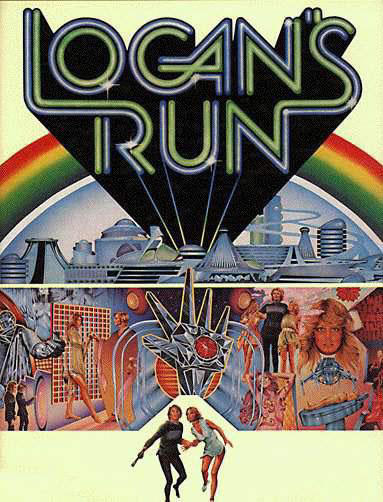 Considered by many to be a classic dystopian story, Logan's Run takes place in a 22st century society where age and consumption are strictly curtailed to ensure that a population explosion – like the one experience in the year 2000 – never happens again. In addition, society is controlled by a computer that runs the global infrastructure and makes sure that the all the dictates of population and age control are obeyed.
Considered by many to be a classic dystopian story, Logan's Run takes place in a 22st century society where age and consumption are strictly curtailed to ensure that a population explosion – like the one experience in the year 2000 – never happens again. In addition, society is controlled by a computer that runs the global infrastructure and makes sure that the all the dictates of population and age control are obeyed.
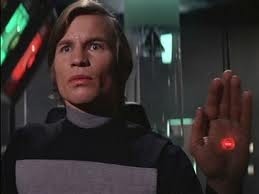 In any case, the story revolves around this concept of an age ceiling, where people are monitored by a "palm flower" that changes color every seven years. When they reach 21 – on a person's Lastday – the crystal turns black and they are expected to report to a "Sleepshop" where they will be executed. Those who refuse to perform this final duty are known as "Runners", and it falls to "Deep Sleep Operatives" (aka. Sandmen) to track down and terminate these people.
In any case, the story revolves around this concept of an age ceiling, where people are monitored by a "palm flower" that changes color every seven years. When they reach 21 – on a person's Lastday – the crystal turns black and they are expected to report to a "Sleepshop" where they will be executed. Those who refuse to perform this final duty are known as "Runners", and it falls to "Deep Sleep Operatives" (aka. Sandmen) to track down and terminate these people.
The main character – Logan 3 – is one such operative. On his own Lastday, he is charged with infiltrated the underground railroad of Runners and finding the place they call "Sanctuary". This is a place where they are able to live out their lives without having to worry about society's dictates and controls. However, in time, Logan comes to sympathize with these people, due largely to the influence of a woman named Jessica 6. In the end, the two make plans to escape together for Sanctuary, which turns out to be a colony on Mars.
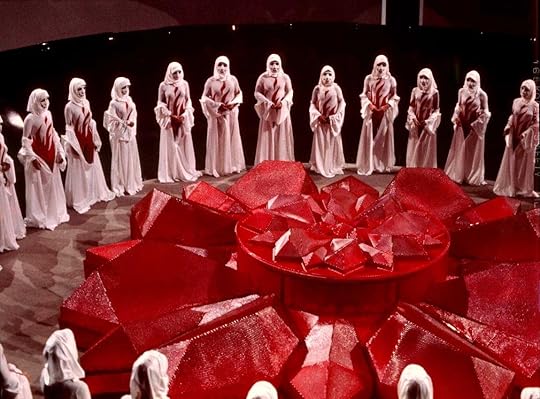 Right off the bat, some additional elements can be seen here. In addition to the concepts of Malthusian controls and ageism, there is also the timeless commentary on how rationalization and regimentation can lead to inhumanity and repression. Much like in We or Anthem (by Ayn Rand), people do not have names as much as designations. All life is monitored and controlled by a central computer, and it is made clear towards the end that the computer is in fact breaking down. I can remember this last theme appearing in an episode of Star Trek TNG, where a planet of advanced people are beginning to die off because their "Custodian" is malfunctioning and no one knows how to fix it.
Right off the bat, some additional elements can be seen here. In addition to the concepts of Malthusian controls and ageism, there is also the timeless commentary on how rationalization and regimentation can lead to inhumanity and repression. Much like in We or Anthem (by Ayn Rand), people do not have names as much as designations. All life is monitored and controlled by a central computer, and it is made clear towards the end that the computer is in fact breaking down. I can remember this last theme appearing in an episode of Star Trek TNG, where a planet of advanced people are beginning to die off because their "Custodian" is malfunctioning and no one knows how to fix it.
Metropolis: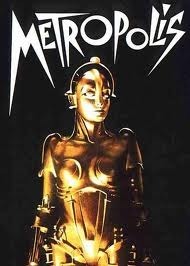 A true classic of both film and expressionist art, this movie also has the added (and perhaps dubious) honor of being a classic of dystopian science fiction! Created in Weimar Germany in 1927 by Fritz Lang, this movie tells the story of a dystopian future where society is ruled by elites who live in vast tower complexes and the workers lives in the recesses of the city far below them where they operate the machinery that powers it all.
A true classic of both film and expressionist art, this movie also has the added (and perhaps dubious) honor of being a classic of dystopian science fiction! Created in Weimar Germany in 1927 by Fritz Lang, this movie tells the story of a dystopian future where society is ruled by elites who live in vast tower complexes and the workers lives in the recesses of the city far below them where they operate the machinery that powers it all.
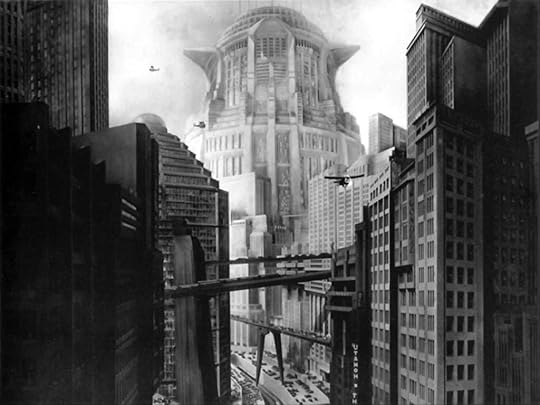 This physical divide serves to mirror the main focus of the story, which is on class distinction and the gap between rich and poor. To illustrate this artistic vision, director Fritz Lang relied on a combination of Gothic, classical, modern and even Biblical architecture. In an interview, Fritz claimed that his choices for the set design were based largely on his first trip to New York where he witnessed skyscrapers for the first time. In addition, the central building of the futuristic city was based on Brueghel's 1563 painting of the Tower of Babel (right>).
This physical divide serves to mirror the main focus of the story, which is on class distinction and the gap between rich and poor. To illustrate this artistic vision, director Fritz Lang relied on a combination of Gothic, classical, modern and even Biblical architecture. In an interview, Fritz claimed that his choices for the set design were based largely on his first trip to New York where he witnessed skyscrapers for the first time. In addition, the central building of the futuristic city was based on Brueghel's 1563 painting of the Tower of Babel (right>).
The theme of class conflict is further illustrated by the fact that the workers who live in the bowels of the city are also responsible for maintaining the machinery that makes the city run. One is immediately reminded of H.G. Wells' The Time Machine and the divide between the Morlocks and the Eloi. This comes through even more when the workers decide to revolt and begin ransacking the neighborhoods of the elites. Ultimately, it is only through the love of the two main characters – Freder and Mariah – that the gulf between the two is sealed and order is restored, a fitting commentary on how society must come together in order to survive and achieve social justice.
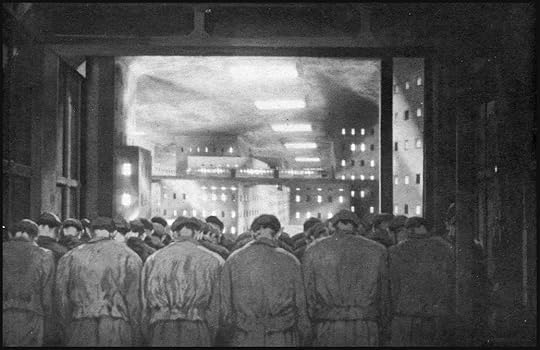 In another act of blatant symbolism, we learn early on in the movie that the workers have taken to congregating in a series of tunnels that run under the city. It is here that they meet with Maria, their inspirational leader, and makes plans to change society. So in addition to tall, Babel-like buildings illustrated the gap between rich and poor, we have workers who are literally meeting underground! Wow…
In another act of blatant symbolism, we learn early on in the movie that the workers have taken to congregating in a series of tunnels that run under the city. It is here that they meet with Maria, their inspirational leader, and makes plans to change society. So in addition to tall, Babel-like buildings illustrated the gap between rich and poor, we have workers who are literally meeting underground! Wow…
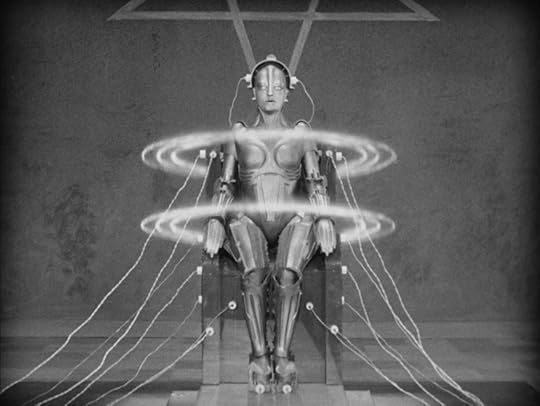 In addition, several other dystopian elements weave their way into the story. The line between artifice and reality also makes an appearance in the form of the robot which the movie is best known for. This robot was created by Rotwang, a scientist who is in the service of the main character's father – Joh Fredersen, the master of the city. Apparently, this robot is able to take human form and was created to replace his late wife. Once this robot was released into the city, she began sowing chaos amongst men who begin to lust after her, and is the very reason the workers began revolting in the first place. She even causes the character of Rotwang to go insane when he can no longer distinguish between the robot and the woman she's impersonating.
In addition, several other dystopian elements weave their way into the story. The line between artifice and reality also makes an appearance in the form of the robot which the movie is best known for. This robot was created by Rotwang, a scientist who is in the service of the main character's father – Joh Fredersen, the master of the city. Apparently, this robot is able to take human form and was created to replace his late wife. Once this robot was released into the city, she began sowing chaos amongst men who begin to lust after her, and is the very reason the workers began revolting in the first place. She even causes the character of Rotwang to go insane when he can no longer distinguish between the robot and the woman she's impersonating.
Neuromancer/Sprawl Trilogy: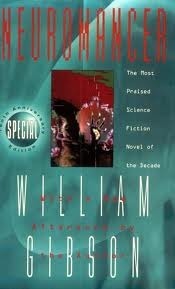 Gibson is one of the undisputed master's of cyberpunk and future noire lit and it was this novel – Neuromancer – that started it all for him. In it, he coined the terms cyberspace, the matrix, and practically invented an entire genre of Gothic, techno-noire terminology which would go on to inspire several generations of writers. His work is often compared to Blade Runner given the similar focus on urban sprawl, cybernetic enhancements, the disparity between rich and poor, and the dark imagery it calls to mind.
Gibson is one of the undisputed master's of cyberpunk and future noire lit and it was this novel – Neuromancer – that started it all for him. In it, he coined the terms cyberspace, the matrix, and practically invented an entire genre of Gothic, techno-noire terminology which would go on to inspire several generations of writers. His work is often compared to Blade Runner given the similar focus on urban sprawl, cybernetic enhancements, the disparity between rich and poor, and the dark imagery it calls to mind.
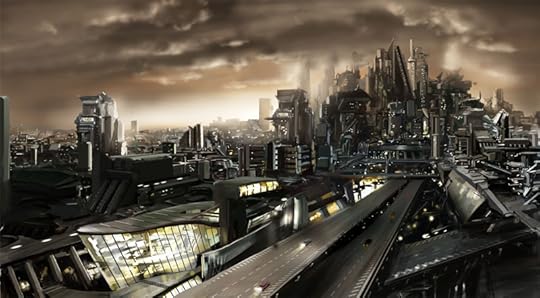 The first installment in the "Sprawl Trilogy", this book takes place in the BAMA – the Boston-Atlanta Metropolitan Axis (aka. The Sprawl). In this world of the 21st century, cyberspace jockeys or cowboys use their "decks" – i.e. consoles – to hack into corporate databases and steal information. The purpose is, as always, to sell off the information to the highest bidder, usually another corporate power. In addition, guerrilla tactics and domestic terrorism are often used to get employees out of their contracts, seeing as how most companies have no intention of ever letting their talent go!
The first installment in the "Sprawl Trilogy", this book takes place in the BAMA – the Boston-Atlanta Metropolitan Axis (aka. The Sprawl). In this world of the 21st century, cyberspace jockeys or cowboys use their "decks" – i.e. consoles – to hack into corporate databases and steal information. The purpose is, as always, to sell off the information to the highest bidder, usually another corporate power. In addition, guerrilla tactics and domestic terrorism are often used to get employees out of their contracts, seeing as how most companies have no intention of ever letting their talent go!
Also, there is the massive gulf that exists between the rich and the poor in these novels. Whereas the main characters tend to live in overcrowded tenements and dirty neighborhoods, the rich enjoy opulent conditions and control entire parts of the world. In addition, the richest clans, such as the Tessier-Ashpools and Vireks, actively use cloning and clinical immortality to cheat death, and often live in orbital colonies that they have exclusive rights to. Much like in his "Bigend Trilogy", much attention is dedicated to the transformative power of wealth and how it affords one better access to the latest in technology.
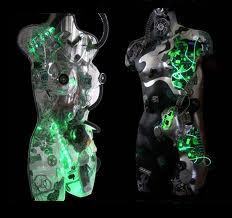 But always, the focus is on the street. Here, jockeys, freelancers and Yakuza agents are at work, pulling jobs so they can buy themselves the latest enhancements and the newest gear. In the case of Molly Millions, a freelance lady-ninja, this includes razor nails that extend from her fingertips. In the case of Yakuza enforcer from the short-story (and movie) Johnny Mnemonic, it consists of a filament of monomolecular razor wire hidden inside his thumb. For others, it might consist of artificial limbs, new organs, implants of some kind. Whatever ya need, they got it in the Sprawl. If not, you go to Chiba City or Singapore, chances are it was made there anyway!
But always, the focus is on the street. Here, jockeys, freelancers and Yakuza agents are at work, pulling jobs so they can buy themselves the latest enhancements and the newest gear. In the case of Molly Millions, a freelance lady-ninja, this includes razor nails that extend from her fingertips. In the case of Yakuza enforcer from the short-story (and movie) Johnny Mnemonic, it consists of a filament of monomolecular razor wire hidden inside his thumb. For others, it might consist of artificial limbs, new organs, implants of some kind. Whatever ya need, they got it in the Sprawl. If not, you go to Chiba City or Singapore, chances are it was made there anyway!
*Interesting Fact: according to Gibson, Blade Runner came out when he was still tinkering with the manuscript for this novel. After seeing it, he nearly threw the manuscript out because he was afraid Ridley Scott had pre-empted him! Funny how things work out, huh?
Final Thoughts:
Gee, there really isn't much more to say is there? One thing I have noticed is that much of modern dystopia comes to us in the form of the cyberpunk genre. Though the definition of cyberpunk appears to constantly be evolving, it is generally acknowledged that it is a postmodern form of science fiction that combines "high tech and low life." Having sorted through several modern examples of dystopian sci-fi, I can say that this is certainly an apt description.
In essence, it assumed that the presence of high tech would entail the emergence of a dystopian society, that the endless march of progress would lead to the destruction of the environment, the devaluing of human life, the elimination of privacy, and the line between real and fake. This last aspect was especially important, embracing cybernetics, virtual reality, and things like cloning and clinical mortality. Since the 1980′s, all of these notions have infiltrated science fiction movies, television, and have even become cliches to some extent.
This genre has given rise to new kinds of science fiction as well. For example, it is generally acknowledged that a sub genre known as post-cyberpunk emerged in the 1990′s which broke away from its predecessor in one key respect. Whereas it too focused on the rise of technology, it did not anticipate dystopia as part of the process. This is best exemplified by books such as Neal Stephenson's The Diamond Age, a 21st century bildungsroman which predicted vast social and political changes as a result of nanotechnology.
Other sub genres that have emerged in recent years include "Steampunk", a literary form that combines Victorian era technologies with the punk genres noire sensibilities. Other derivatives include Dieselpunk, Nanopunk, Biopunk, and even fantasy-punk crossovers like Elfpunk. Yes, like most things in the post modern era, it seems that literary genres are becoming fragmented and tribalistic!
But alas, I still feel the need to ask the question, what's happened to dystopian literature of late? In my initial post, I got a lot of people asking me if I could include examples of more modern examples. You know, stuff that's come out since 1984 and The Handmaids Tale. But unfortunately, what I've found tends to be more of the same. Just about every example of dystopian fiction appears to draw its inspiration from such handy classics as the one's I've already mentioned, or is in some way traceable to them. Does this mean that we've hit bottom on the whole genre, or could it just be we've moved away from it for the time being?
Well, I recently learned from an article on IO9 that Neal Stephenson himself stated that science fiction needed to stop being so pessimistic and had to start getting inspirational again. Perhaps he's onto something… Maybe we've gone too far with the whole cautionary tale and need to steer things back towards a brighter future, urging people on with common sense and technological solutions rather than laments. Maybe we need to let them know that such problems as world hunger, overpopulation, pollution, climate change, poverty, war, licentiousness and greed can all be overcome.
Then again, I'm working on a couple dystopian tales right now… Is it too much to ask that this craze last just a few years longer?
Thanks to all who've written in and "liked" my dystopian series! Hope to see y'all again soon as I get into ore cheerful things…








March 29, 2012
Dystopia in Popular Culture
Picking up where I left off last time, I thought I'd get into some examples of how dystopian fiction has influenced popular culture. And given all the feedback I got on my previous post, I also wanted to incorporate some suggested titles as well. But, just to be clear, I still haven't read Hunger Games, so please don't ask about it!
Alright, so last time, I mentioned just about every examples of dystopian literature I could find. From the earliest examples of Candide and Gulliver's Travellers, onto the more modern interpretations of The Time Machine and We, and culminating with classics like BNW and 1984, I essentially ended before I could get into how these novels have had an influence on film and other media. In addition to inspiring the written words, these classics have inspired an entire culture of iconography, symbolism and motifs.
Not surprising, really. Every work of dystopian fiction and satire has sought to create images in the reader's mind, using highly specific descriptions in order to paint a scene and inspire the right mood. Whenever these novels have been adapted to film, or directors were simply trying to convey similar themes, the task of properly conveying it all visually has always been a hefty one. The same is true for graphic novels and any other visual medium. So today, just for fun, and perhaps to complete my romp through the realm of this inspired genre, here are some examples of dystopia in modern media:
Blade Runner: Granted, Blade Runner was based on Philip K Dick's Do Android Dream of Electric Sheep?, a dystopian story in some respects, but not in the same way that the movie was. Whereas the novel took place in a post-apocalyptic Los Angeles (circa 2019) which is sparsely populated and where a living animal is seen as a status symbol. In the movie, the year and location are the same, but the setting is starkly different. Here, it is a stuffy, polluted, mega-city made up of massive skyscrapers and giant animated billboards, where the streets are dirty and packed with people who spoke a strange dialect known as Cityspeak (check out my post on Cityspeak for on that).
Granted, Blade Runner was based on Philip K Dick's Do Android Dream of Electric Sheep?, a dystopian story in some respects, but not in the same way that the movie was. Whereas the novel took place in a post-apocalyptic Los Angeles (circa 2019) which is sparsely populated and where a living animal is seen as a status symbol. In the movie, the year and location are the same, but the setting is starkly different. Here, it is a stuffy, polluted, mega-city made up of massive skyscrapers and giant animated billboards, where the streets are dirty and packed with people who spoke a strange dialect known as Cityspeak (check out my post on Cityspeak for on that).
And what made it all so awesome, aside from the plot, was the attention to detail. Director Ridley Scott, the same man who brought us Aliens, brought his usual artistic touch and a team of first-grade set designers to the table. Overall, they produced some pretty awesome concepts, ones which are still being praised to this day. Here are just a few:
 The Tyrell Corp. building, which was kind of the focal point of the movie. Early on, we get a birds-eye view of it as Detective Deckard Cain (Harrison Ford) is being flown there in a Spinner (flying car). Later on, the leader of the Replicant party, Roy Batty, travels there as well seeking answers to some of life's most basic questions.
The Tyrell Corp. building, which was kind of the focal point of the movie. Early on, we get a birds-eye view of it as Detective Deckard Cain (Harrison Ford) is being flown there in a Spinner (flying car). Later on, the leader of the Replicant party, Roy Batty, travels there as well seeking answers to some of life's most basic questions.
For starters, the building is clearly based on a the design of a Ziggurat, the breed of ancient Babylon temple that inspired such legends as the "Tower of Babel", and which serves as a clear representation for the almost godlike power Tyrell wields. The interior design, with its large columns, soft lighting, candles, an owl (a possible reference to Athena's owl) and the way Tyrell can block out the sun at will all serve to further illustrate this point. That scene near the end where is dressed in lavish white robes also seemed pretty symbolic, I'd say!
And for those who read 1984, there is a possible encoded reference to the four ministries as well- Truth, Peace, Love, and Plenty – all of which were pyramid-like in design. Coincidence? Who knows? All that matter is when it comes to massive structures that harken back to ancient Egypt and Mesapotamia, the symbolic value is clear. Much like the civilizations that built them, these things stood for power and dominion, both over lesser subjects and the afterlife itself. They were the ruler's way of achieving immortality by creating something that embodied their power and would stand the test of time. As Shelley said in his poem "Ozymandias": "Look on my works, ye mighty, and despair!"
And when it comes right down to it, this old-world kind of mentality, updated for the modern age, is indispensable to any dystopian story: Absolute power, wielded by the few over the many and represented in conspicuous and obvious ways! In many cases, it comes in the form of totalitarian governments (a la The Party) who runs things with an iron fist and build massive government buildings to remind everyone of who's in charge. But in other cases, it takes the form or corporate dominance, where the wealthy rule society like feudal barons while the rest live like serfs. And much like their bureaucratic peers, they choose to lord this by building lavish buildings to themselves and covering themselves with ornate symbols!
 Another trademark bit of dystopian set design were the massive skyscrapers, complete with giant video-billboards. No doubt, these too were designed to give the impression of the control corporations had over the people of LA in the future. As if regular sized billboards ads weren't enough, (or televised, print, bench, flier, blimp, and radio ads) now it seemed that corporate monopolies were splastering their logo's on screens the size of buildings!
Another trademark bit of dystopian set design were the massive skyscrapers, complete with giant video-billboards. No doubt, these too were designed to give the impression of the control corporations had over the people of LA in the future. As if regular sized billboards ads weren't enough, (or televised, print, bench, flier, blimp, and radio ads) now it seemed that corporate monopolies were splastering their logo's on screens the size of buildings!
And just to make it realistic, Ridley Scott and his designers were also sure to use logos that were already big in the early 80′s and seemed destined to get bigger – Atari, Coca Cola, Pan Am Air, Cuisinart, Bell System. But interestingly enough, all of these companies suffered heavy losses after the movie's release. The phenomena came to be known as the "Blade Runner Curse". Strange, one would think audiences began associating them with dark imagery or something 
 But personally, I think one of the most effective aspects of the movie's look and feel came through in the construction of the streets. Here, Scott's design team made sure that every shot was crammed full of people who whore plastic jumpers, dark glasses, cool headgear, and carried what looked like umbrellas with neon handles. Then came the street vendors who peddled food or exotic pets in the same neighborhoods, facades that were ashen grey in color, and all kinds of neon signs written in various languages. It painted quite the scene, one which can only be described by the words "Future Noire".
But personally, I think one of the most effective aspects of the movie's look and feel came through in the construction of the streets. Here, Scott's design team made sure that every shot was crammed full of people who whore plastic jumpers, dark glasses, cool headgear, and carried what looked like umbrellas with neon handles. Then came the street vendors who peddled food or exotic pets in the same neighborhoods, facades that were ashen grey in color, and all kinds of neon signs written in various languages. It painted quite the scene, one which can only be described by the words "Future Noire".
Brazil:  Directed by Terry Gilliam, an old-time member of the comedy troupe Monty Python and director of such movies as The Adventures of Baron Munchausen, The Fisher King and 12 Monkeys, Brazil was a rather humorous take on the classic 1984. In it, we are presented with a dystopian society that is ruled by a totalitarian regime, but which is buffoonish and incompetent rather than exacting and brutal.
Directed by Terry Gilliam, an old-time member of the comedy troupe Monty Python and director of such movies as The Adventures of Baron Munchausen, The Fisher King and 12 Monkeys, Brazil was a rather humorous take on the classic 1984. In it, we are presented with a dystopian society that is ruled by a totalitarian regime, but which is buffoonish and incompetent rather than exacting and brutal.
In addition, the people in this world are also overly-dependent on machinery which is rather unreliable and poorly maintained. And last of all, there is the main character of Sam Lowry, a low-level government employee who works in a mind-numbing government job, lives in a small apartment, and is having prescient dreams about a woman and a man in mask who is torturing him.
 The movie shared many plot and thematic elements with 1984, but much of its genius comes through in the set design and direction. Given that the aim of the movie was to present a world in which the machinery is as undependable as the bureaucracy, Gilliam decided to go with a look that would call to mind the kind of over-the-top aesthetics of past sci-fi films. While everything was admittedly grey, dark, and shot in wide and tilted angles, there was also a sort of comic, retro feel to the whole thing. This helped to establish the central premise of the movie, in which incompetence and mind-drudging inefficiency were what was destroying humanity, not a specific agenda.
The movie shared many plot and thematic elements with 1984, but much of its genius comes through in the set design and direction. Given that the aim of the movie was to present a world in which the machinery is as undependable as the bureaucracy, Gilliam decided to go with a look that would call to mind the kind of over-the-top aesthetics of past sci-fi films. While everything was admittedly grey, dark, and shot in wide and tilted angles, there was also a sort of comic, retro feel to the whole thing. This helped to establish the central premise of the movie, in which incompetence and mind-drudging inefficiency were what was destroying humanity, not a specific agenda.
 In addition, Gillian had much to say about artifice and vanity in this film. Lowry's mother, who plays an important role in the plot, is obsessed with plastic surgery which she hopes will make her look younger. Towards the end of the movie, Lowry dreams that his mother is attending the funeral of a friend who died as a result of too many invasive procedures. And in what can only be described as an moment of oedipal confusion, his mother even looks like Jill, the much younger woman he has fallen in love with!
In addition, Gillian had much to say about artifice and vanity in this film. Lowry's mother, who plays an important role in the plot, is obsessed with plastic surgery which she hopes will make her look younger. Towards the end of the movie, Lowry dreams that his mother is attending the funeral of a friend who died as a result of too many invasive procedures. And in what can only be described as an moment of oedipal confusion, his mother even looks like Jill, the much younger woman he has fallen in love with!
An interesting take on 1984 isn't it? Rather than following a philosophy like the one espoused by O'Brien, where the Party wields absolute control over reality and people's minds, want to eliminate all emotion except hatred, and has destroyed any activities that do not serve their interests, the totalitarian regime in Brazil is instead motivated by laziness and a desire to cover its own ass. Not being wrong literally means more to them than the lives of their citizens. What better commentary is there on a bureaucratized society?
Judge Dredd: Yes, the movie didn't so well, and the script and plot were so simplistic that Stallone himself called it a "no-brainer". But that doesn't change the fact that the source material is actually one of the better graphic novels in existence, especially when it comes to depth and irony. Set in a post-apocalyptic world of the not-too-distant future, the comics take place for the most part inside "Mega City One", one of several megalopolis's that have sprung up in the US after a nuclear war which left it and Soviet Union utterly devastated.
Yes, the movie didn't so well, and the script and plot were so simplistic that Stallone himself called it a "no-brainer". But that doesn't change the fact that the source material is actually one of the better graphic novels in existence, especially when it comes to depth and irony. Set in a post-apocalyptic world of the not-too-distant future, the comics take place for the most part inside "Mega City One", one of several megalopolis's that have sprung up in the US after a nuclear war which left it and Soviet Union utterly devastated.
Within this city, just about everything is automated and unemployment is almost universal. Every city block contains over fifty-thousand people, amounting to a population of about 400 million people per city. Due to overcrowding, massive unemployment and uncontrollable violence, the leaders of this future society created a quasi-fascist justice system whereby individual "Street Judges" (policemen) were charged with dispensing judgement and punishment on site. This had a stabilizing effect on society, but the problems remain…
 Automatically, one can see a few things at work here. For starters, there's the Hobbesian idea of man in the state of nature; how because of nuclear war, life became "nasty, brutish and short" and a tyrannical system was needed to put things back in order. In addition, there's the whole "who polices the police?" side of things, where audiences naturally fear that the judges will abuse their power or fight to the death to hang onto it.
Automatically, one can see a few things at work here. For starters, there's the Hobbesian idea of man in the state of nature; how because of nuclear war, life became "nasty, brutish and short" and a tyrannical system was needed to put things back in order. In addition, there's the whole "who polices the police?" side of things, where audiences naturally fear that the judges will abuse their power or fight to the death to hang onto it.
And last, there is the very real sociological concept of the "megalopolis", the Northeastern mega city running from Virginia to Maine which was originally coined by French geographer Jean Gottmann. In the course of the comic's history, it is made clear that Mega City One was not actually designed, but grew out of natural urban sprawl that predated the nuclear war. It was only after the war that it became a self-contained place where automation, unemployment and chaos become so rampant.
 Now one might also get the impression that this was all meant to illustrate some preachy, "we made a mistake" kind of message (which is in fact what happened in the movie). But in truth, these issues are presented with a fair degree of subtly and irony in the graphic novel.
Now one might also get the impression that this was all meant to illustrate some preachy, "we made a mistake" kind of message (which is in fact what happened in the movie). But in truth, these issues are presented with a fair degree of subtly and irony in the graphic novel.
Knowing full well how his audience would react to fascist symbols and ideology, John Wager (creator) presented readers with a story that is loaded with both. For starters, the Judge's symbol is an eagle, which bears a striking resemblance to the Nazi black eagle. The Judge's uniform is also highly ornate and calls to mind the classical imperial motifs of Centurions and Gladiators. And the fact that Dredd's face is never seen can only be seen as highly indicative. He's a faceless law-giver, much like Stormtroopers or the SS.
What's more, the people who sport these symbols and preach these values are presented as heroes. Judge Dredd, for all intents and purposes, is a social fascist who is bereft of sentimentality, doubt or remorse over what he does. Unlike the other Judges, there's no crime he won't ignore, and he never stops for more than ten minutes at a time to rest in a sleep chamber, then he's back on the job. He also has little sympathy for people who believe in enlightened reform or who criticize the Street Judges for their abuses of power.
The purpose of this always seemed to be for the sake of ironic social commentary. Rather than condemning the Judges and the system they represent (or endorsing them) we are meant to see how – under the right circumstances – something like this could very well happen!
THX 1138: You know, its movies like this that remind us all that there was a time that George Lucas had talent, when he cared about thing like plots and inspired story-telling, and not special effects and merchandizing. But I'll leave my riffs about the Star Wars prequels for another day. Right now, I will admit that there is plenty about this directorial debut worth praising, and not the least of which was the faithful dystopian tone it struck.
You know, its movies like this that remind us all that there was a time that George Lucas had talent, when he cared about thing like plots and inspired story-telling, and not special effects and merchandizing. But I'll leave my riffs about the Star Wars prequels for another day. Right now, I will admit that there is plenty about this directorial debut worth praising, and not the least of which was the faithful dystopian tone it struck.
 Set in a dystopian future where the human race is required by law to take drugs that suppress emotion and sexual desires, are controlled by android police, and all inhabitants worship a godlike being known as OMM 0910, the story is clearly a commentary on how rationalization and automation threatened to destroy humanity. In addition, there are clear and obvious parallels to novels like We, Brave New World and 1984.
Set in a dystopian future where the human race is required by law to take drugs that suppress emotion and sexual desires, are controlled by android police, and all inhabitants worship a godlike being known as OMM 0910, the story is clearly a commentary on how rationalization and automation threatened to destroy humanity. In addition, there are clear and obvious parallels to novels like We, Brave New World and 1984.
For example, the people in this future are all given designations instead of names, the state sanctioned religion is reminiscent of Big Brother, and the mandatory use of mind altering drugs calls to mind Soma. And of course, the stark, clinical portrayal of society in the future is very similar to descriptions of the One State and Oceania in We and 1984. And let's not forget the scene were android police torture and abuse the main character? Tell me that didn't come directly out of the scenes where Winston was languishing in the Ministry of Love!
 And of course the overall moral of the story, that love is precious and will fight the odds against the forces of cold rationality, this too was practically lifted from Orwell's and Zamyatin 's classics! This is not a criticism, mind you. If anything, Lucas demonstrated a keen ability to adopt freely from novels and franchises in a way that really worked. Much as he would do with Star Wars just a few years later, he seemed to know where to borrow from and how to put it all together!
And of course the overall moral of the story, that love is precious and will fight the odds against the forces of cold rationality, this too was practically lifted from Orwell's and Zamyatin 's classics! This is not a criticism, mind you. If anything, Lucas demonstrated a keen ability to adopt freely from novels and franchises in a way that really worked. Much as he would do with Star Wars just a few years later, he seemed to know where to borrow from and how to put it all together!
The Watchmen: Now this was one of my favorite graphic novels of all time. Lucky for me, it also falls into the realm of dystopian fiction, hence I can talk about it here! In addition to taking place in an alternate universe, the setting is one which is quite dark and gritty. Set in the 1980′s, which is the same period in which it was written, the story is of an alternate reality where the existence of superheroes has caused history to diverge quite a bit from our own. Technically, superheroes have been in existence for many decades, which helps to give the story a real sense of historicity.
Now this was one of my favorite graphic novels of all time. Lucky for me, it also falls into the realm of dystopian fiction, hence I can talk about it here! In addition to taking place in an alternate universe, the setting is one which is quite dark and gritty. Set in the 1980′s, which is the same period in which it was written, the story is of an alternate reality where the existence of superheroes has caused history to diverge quite a bit from our own. Technically, superheroes have been in existence for many decades, which helps to give the story a real sense of historicity.
 However, it was with the service of superheroes in actual wars and government programs that caused history to shift. Beginning with Doctor Manhattan's intervention in Vietnam and culminating in the development of cheap, renewable energy by Ozymandias (with Manhattan's help), the Cold War took an unexpected turn. Russia was systematically beaten back to the point where it was becoming desperate and nuclear war seemed inevitable. Meanwhile, society began to decay as war began to occupy more and more of society's attention and the inner cities were neglected and left to rot.
However, it was with the service of superheroes in actual wars and government programs that caused history to shift. Beginning with Doctor Manhattan's intervention in Vietnam and culminating in the development of cheap, renewable energy by Ozymandias (with Manhattan's help), the Cold War took an unexpected turn. Russia was systematically beaten back to the point where it was becoming desperate and nuclear war seemed inevitable. Meanwhile, society began to decay as war began to occupy more and more of society's attention and the inner cities were neglected and left to rot.
 Told for the point of view of Rorschach, a borderline social fascist with deep-seated issues, the darkness and impending sense of doom really come through! As he investigates the death of the Comedian, a fellow superhero who's death incites the whole plot, we learn how both he, the Watchmen, and society came to be the way it is. His own tragic story, and that of the Comedians, serves to illustrate how the American Dream failed and cynicism and fear took over.
Told for the point of view of Rorschach, a borderline social fascist with deep-seated issues, the darkness and impending sense of doom really come through! As he investigates the death of the Comedian, a fellow superhero who's death incites the whole plot, we learn how both he, the Watchmen, and society came to be the way it is. His own tragic story, and that of the Comedians, serves to illustrate how the American Dream failed and cynicism and fear took over.
But of course, the point with dystopian stories is not just to speculate, but to make a point about the time in which it was written. Looked at from this angle, the Watchmen was really telling us about the real world of the 1980′s, a world which had come very far since the post-war era in terms of technological, social and cultural development. And like many other cultural commentaries, a sense of failure and betrayal is at work. What happened to the post-war dream? What happened to the American Dream? How did poverty, crime, licentiousness and cynicism become so rampant? From Rorschach point of view, the Cold War is largely to blame, but so is human nature. And given that he is such a dark and messed up character, I don't think his opinions were meant to be taken too seriously!
V for Vendetta: Yet another awesome graphic novel, and one which also inspired a hit movie adaptation. A piece of speculative fiction, this series was produced in the 1980′s and was set in a near-future dystopian England. Over the years, this series' thematic elements and symbolism have been compared to 1984. However, in truth, the story has much more in common with The Iron Heel and It Can't Happen Here, by Sinclair Lewis (which should have made my list of dystopian literature, dammit!) In these two novels, especially the latter, a fascist regime takes power by appealing to the people's sense of moral purity and a desire for order, and in the end the people got more than they bargained for!
Yet another awesome graphic novel, and one which also inspired a hit movie adaptation. A piece of speculative fiction, this series was produced in the 1980′s and was set in a near-future dystopian England. Over the years, this series' thematic elements and symbolism have been compared to 1984. However, in truth, the story has much more in common with The Iron Heel and It Can't Happen Here, by Sinclair Lewis (which should have made my list of dystopian literature, dammit!) In these two novels, especially the latter, a fascist regime takes power by appealing to the people's sense of moral purity and a desire for order, and in the end the people got more than they bargained for!
But alas, the story in the comic book version involves nuclear war and the transformation of the UK into "lifeboat Britain". Given that the movie was made in the early 2000′s, the story had to be updated somewhat. There, the focus shifted to terrorism and the exploitation of fear – echoes of The Handmaids Tale and "Loose Change" there, but I digress. After being passed over by the nuclear holocaust, Britain found itself being flooded with refugees and victims of the war. Bit by bit, authoritarian measures were put into place to deal with the crisis, until eventually, the fascist government of Norsefire took over, and that's when the real changes happened!
 They're motto: "Strength Through Purity, Purity through Faith" pretty much sums it up! In addition to pushing a religious agenda, they were also very much concerned with purging British society or minorities and "undesirables". A police state was put into place where a series of departments – the Eyes, Ears, Mouth, and Hands – were tasked with controlling and monitoring all aspects of society. The Eyes handled surveillance, the Ears listened to people's by tapping their phones and bugging their homes, the Mouth disseminated propaganda, and the Hands investigated criminal activity. And of course all minorities, be they racial minorities, homosexuals, or just political dissidents, were sent to concentration camps where they were exterminated and experimented on.
They're motto: "Strength Through Purity, Purity through Faith" pretty much sums it up! In addition to pushing a religious agenda, they were also very much concerned with purging British society or minorities and "undesirables". A police state was put into place where a series of departments – the Eyes, Ears, Mouth, and Hands – were tasked with controlling and monitoring all aspects of society. The Eyes handled surveillance, the Ears listened to people's by tapping their phones and bugging their homes, the Mouth disseminated propaganda, and the Hands investigated criminal activity. And of course all minorities, be they racial minorities, homosexuals, or just political dissidents, were sent to concentration camps where they were exterminated and experimented on.
 Into all this enters the character of V, an anarchist revolutionary who is the product of one camp's twisted experiments. As a result of their invasive procedures, he became an enigmatic genius/amnesiac with a serious chip on his shoulder who is now on a quest to pay the government back for its crimes. His famous disguise, the Guy Fawkes mask and robes of black and red, are as intrinsic to establishing his character as his monologues and affinity for blowing up government buildings!
Into all this enters the character of V, an anarchist revolutionary who is the product of one camp's twisted experiments. As a result of their invasive procedures, he became an enigmatic genius/amnesiac with a serious chip on his shoulder who is now on a quest to pay the government back for its crimes. His famous disguise, the Guy Fawkes mask and robes of black and red, are as intrinsic to establishing his character as his monologues and affinity for blowing up government buildings!
Judging by the color scheme alone, one immediately can tell that this man is an anarchist by his use of the color black (or anarcho-syndicalist seeing as how he combines it with red). The mask is a further indication of this, given that Guy Fawkes was a radical who tried to blow up parliament because he believes any vestige of government to be anathema to freedom. So in the end, we can see that this a man who wants to bring down the system and is reaching into Britain's forgotten past to resurrect the idea of civil liberty.
In contrast, Norsefire's logo was pretty straightforward too. In the comic, Norsefire represented itself on its "motivational posters" with a set of white wings with a space in the middle that was in the shape of a cross, and behind it lay flames. This is obviously meant to conjure up images of religious propriety, or holy war, and of action, all of which are clear allusions to fascist and religious-right iconography. It was also meant, in my opinion, to call to mind Britain's Action Party, a fascist political group that played a small but influential role in British political life during the 1970′s.
In any case, one can see several staples of dystopia at work in this series, hence why it earned a loyal following and garnered so much critical acclaim. In addition to the idea of a nuclear war breeding totalitarian regime in Britain (right out of 1984), of "Lifeboat Britain" giving rise to a fascist regime (which may have helped to inspire the novel Children of Men) and countless allusions to Nazism and how it really could take root in Britain – which calls to mind Orwell's essay "England Your England" where he basically asserted that it couldn't.
Final Thoughts:
Wow, this sort of stuff makes me feel head-heavy and tired! It seems that when you get into a subject as rich as dystopian literature and its various offshoots, there's no shortage of material! But I think I've learned something from all of this and it's important that I get it right. So bear with me…
As I said in my last post, utopian literature predates dystopian by a couple centuries at least. And I also focused on the differences between the two, how utopian lit shows our failures by using a prefect society as a comparison while dystopian societies show the logical outcome of our most worrisome flaws. However, I've now come to think that the issue is far more complicated than all that. For starters, one can find elements of the former in the latter and vice-versa. What's more, utopian novels and treatises were often loaded with irony, at times truncated themselves to make the point that perfect societies were not so perfect, or perhaps unattainable.
On the other hand, all dystopian novels take as their starting point the idea of a failed utopia. Whether it was a willful lie (as O'Brien revealed in 1984) or an attempt at perfection gone wrong, all dystopians arose out of attempt to create a "perfect society". In the case of the classics written after the 18th century, the inspiration for this is clear. Beginning with the French Revolution, then the Russian, and countless other revolutions who's aim was to radically transform society, it seemed that every attempt to create "real equality" and an "earthly paradise" was doomed to result in tyranny and abuse. Sometimes horribly so!
But the earlier utopian writers didn't have these failed social experiments to point to. In their case, saying that utopias were unattainable would have had to have been purely philosophical. And examples abound! The very word Utopia, for example, is Greek for "no-place". And the narrator of this book, the man who is an apparent specialist on this fabled society, is named Raphael Hythloday. This last name has a Greek root which loosely translates to "expert in nonsense". Samuel Butler, another utopian writer, named his fictional society Erewhon, which is simply "Nowhere" written backwards. In addition, in his "perfect" society, people are punished for being sick and treated for criminal behavior, an inversion of the usual procedure!
I guess its like the dividing line between heaven and hell, or revelation and madness. Somehow, the line is fine, and one misstep can take you from one to the other in the blink of an eye! And, as with everything else, we carry these things with us and project them wherever we go. Well… that was deep! Stay tuned, I'm sure to have something more cheerful for next time!








March 26, 2012
Dystopian Science Fiction
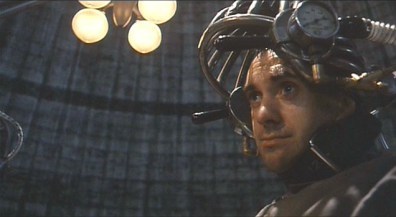 Lately, I've been feeling kind of dystopian! Perhaps it's the fact that I'm working on an anthology of dark science fiction with some fellow writer's over at Goodreads (called Writer's Worth). Or it might just be that this seemed like the next logical step in the whole "conceptual science fiction" thing. Regardless, when it comes to the future, sci-fi writers love to speculate, and it usually takes one of two forms. Either humanity lives in a utopian society, where technology, time and evolution have ferreted out our various weaknesses. Or, we live in a dystopian world, where humanity has either brought itself to the brink of annihilation or is living in dark, polluted and overpopulated environments, the result of excess and environmental degradation.
Lately, I've been feeling kind of dystopian! Perhaps it's the fact that I'm working on an anthology of dark science fiction with some fellow writer's over at Goodreads (called Writer's Worth). Or it might just be that this seemed like the next logical step in the whole "conceptual science fiction" thing. Regardless, when it comes to the future, sci-fi writers love to speculate, and it usually takes one of two forms. Either humanity lives in a utopian society, where technology, time and evolution have ferreted out our various weaknesses. Or, we live in a dystopian world, where humanity has either brought itself to the brink of annihilation or is living in dark, polluted and overpopulated environments, the result of excess and environmental degradation.
As with all things science fiction, the aim here is to use speculative worlds of the future to offer commentary on today. As William Gibson, himself a dark future writer, once said: "Science fiction [is] always about the period in which it was written." So today, I thought I would acknowledge some truly classic examples of dystopian literature and the books that started it all. Here they are:
Earliest Examples:
Dystopian literature, contrary to popular conception, did not begin in the 20th century with Brave New World. In fact, one can find examples going as far back as the Enlightenment, when philosophers and scholars used fictional contexts to illustrate the weaknesses of society and how they might be reformed. And, in many ways, this form of social critique borrowed from Utopian literature, a genre that takes its name from Thomas More's seminal book that describes a perfect fictional society. But where More and earlier writers (such as Plato and St. Augustine) used perfect civilizations to parody contemporary society, this newer breed of authors used dark ones to do the same. In short, Utopian literature showed society how it could be, dystopian literature as it was.
 Candide: A true classic, though it is sometimes difficult to classify this work as a true dystopian work of fiction. For one, it is set in the contemporary world, not in a fictionalized society, and revolves around the life of a fictional character who travels from one region to the next, seeking to answer the fundamental question of whether or not this is "the best of all possible worlds". However, this book remains one of the principle sources of inspiration for science fiction writers when constructing fictional worlds for the sake of satirizing their own.
Candide: A true classic, though it is sometimes difficult to classify this work as a true dystopian work of fiction. For one, it is set in the contemporary world, not in a fictionalized society, and revolves around the life of a fictional character who travels from one region to the next, seeking to answer the fundamental question of whether or not this is "the best of all possible worlds". However, this book remains one of the principle sources of inspiration for science fiction writers when constructing fictional worlds for the sake of satirizing their own.
Published in 1755 by the critic and philosopher Voltaire, the story was inspired by the 1755 Lisbon Earthquake and the church's and Leibnizian's attempts to rationalize it. At the beginning, Candide – the main character who's name means "optimism" – lives in sheltered existence where he is busy studying and living with his friends and companions. However, this existence is quickly interrupted by the arrival of war, and Candide and his companions are forced to travel from place, witnessing all the problems of the world. These include war, slavery, rape, imperialism, abuse of power and exploitation, and takes them from Europe to the Middle East to the Americas. Eventually, they return home and reflect on all they have seen and whether or not this is "the best of all possible worlds". They conclude that it is not, but offer a resolution by saying that "we must cultivate our garden".
 Gulliver's Travels: Another classic example, but which is often considered a combination between utopian and dystopian novels. This is because the plot involves the travels of one man – Gullliver, who's name is a play on the world gullible – who's journey takes him through many fictional worlds where life is either perfect or tragically flawed in various ways. However, since the purpose of these worlds is to parody English society of his day, it is often included as an early example of satiric literature that falls into the utopian, dystopian and science fiction camps.
Gulliver's Travels: Another classic example, but which is often considered a combination between utopian and dystopian novels. This is because the plot involves the travels of one man – Gullliver, who's name is a play on the world gullible – who's journey takes him through many fictional worlds where life is either perfect or tragically flawed in various ways. However, since the purpose of these worlds is to parody English society of his day, it is often included as an early example of satiric literature that falls into the utopian, dystopian and science fiction camps.
The story involves four journeys where Gulliver travels to several fictional societies and records what he sees for posterity. The first voyage takes him to the land of the Lilliputians, a race of tiny people who's morals match their physical size. After some rather brief descriptions of how these people select their leaders (limbo tournaments and other stupid games) we learn that they are a parody of the British system of parliament.
His second voyage takes him to a place which is the polar opposite of the first. Here, in the land of the Brobdingnagians, he is presented with giants who's physical size mirrors their moral outlook. They consider Gulliver to be a curious specimen, who's descriptions of his country disgust them. In the end, they consider him a cute sideshow attraction and refuse his offer for technological advances (like gunpowder). Gulliver then leaves, thinking the people are out of their minds, but ironically states that he witheld the worse about England out of a desire to save face.
His next voyage involves a little "island-hopping", first to the flying city of Laputa, an island nation where technological pursuits are followed without a single regard for the consequences. He then detours to another island, Glubbdubdrib, where he visits a magician's dwelling and discusses history with the ghosts of historical figures. Then onto Luggnagg, where he encounters the struldbrugs – an unfortunate race of people who are immortal but frozen in old age, with all the infirmities that come with it. Gulliver then reaches Japan, which is in the grips of the post-war Shogunate period, and is narrowly excused from taking part in an anti-Christian display which all foreigners were forced to perform at the time.
His final voyage before going home takes him country of the Houyhnhnms, a race of horse-people who see themselves as "the perfection of nature" and who rule over the race of Yahoos – deformed humans who exist in their basest form. Gulliver joins them and comes to adopt their view of humanity – that of base creatures that use reason only to advance their own appetites. However, they soon come to see him as a Yahoo and expel him from their civilization. In the end, Gulliver returns home to regal his family of his adventures, but finds that he cannot relate to them anymore. His journeys have filled him with a sense of misanthropy which he cannot ignore.
Throughout the narrative, Swift's point seems abundantly clear. Each voyage to a fictitious world serves as a means to parody a different element of British society and civilization in general. And ultimately, Gulliver serves as the perfect narrator, in that his ignorance and naivety allow him to absorb the lessons of the journey in a way that is both ironic and sufficiently detached. Can't just hand the reader the moral, after all! Gotta make them work for it!
 The Time Machine: Published in 1895, this science fiction novella inspired countless adaptations and popularized the very idea of time travel. In addition to introducing readers to the concept of time as the fourth-dimension and temporal paradoxes, H.G. Wells also had some interesting social commentary to share. In this story, the narrator – known only as The Traveller – recounts to a bunch of dinner guests how he used a time machine to travel to the year 802, 701 A.D. where he witnessed a strange culture made up of two distinct people's.
The Time Machine: Published in 1895, this science fiction novella inspired countless adaptations and popularized the very idea of time travel. In addition to introducing readers to the concept of time as the fourth-dimension and temporal paradoxes, H.G. Wells also had some interesting social commentary to share. In this story, the narrator – known only as The Traveller – recounts to a bunch of dinner guests how he used a time machine to travel to the year 802, 701 A.D. where he witnessed a strange culture made up of two distinct people's.
On the one hand, there were the Eloi, a society of elegant, beautiful people who live in futuristic (but deteriorating) buildings and do no work. Attempts to communicate with them prove difficult since they seem to possess no innate curiosity or discipline. He assumes that they are a communistic society who have used technology to conquer nature and have therefore evolved (or devolved) to a point where strength and intellect are no longer necessary to survive.
However, this changes when he comes face to face with a separate race of ape-like troglodytes who live in underground enclaves and surface only at night. Within their dwellings he discovers the machinery and industry that makes the above-ground paradise possible. He then realizes that the human race has evolved into two species: the leisured class of the ineffectual Eloi, and the downtrodden working classes that have devolved into the brutish Morlocks. In the course of searching the Morlock enclave, he learns that they also feed on the Eloi from time to time. His revised analysis is that their relationship is not a benign one, but one characterized by animosity and the occasional act of kidnapping and cannibalism.
Is there not a more perfect vision of industrial society or class conflict? Written within the context of turn of the century England, where discrepancies in wealth, class conflict and demands for reform were commonplace, this book was clearly intended to explore social models in addition to scientific ideas. And the commentary was quite effective, if you ask me…
 The Iron Heel: This dystopian work was written by Jack London, the same man who wrote the classic Call of the Wild, and was released in 1908. A clear expression of London's own socialist beliefs, the novel is set in the distant future when a socialist utopia – known as the Brotherhood of Man – has finally been created. Overall, the plot revolves around the "Everhard Manuscript", a testament which details the lives of the story's two main protagonists and which takes place between 1912 to 1932 in the US. The work is known for its big "spoiler", letting readers know outright that the protagonists die in the course of their pursuits, but that there efforts are rewarded by providing inspiration to later generations who succeed where they fail.
The Iron Heel: This dystopian work was written by Jack London, the same man who wrote the classic Call of the Wild, and was released in 1908. A clear expression of London's own socialist beliefs, the novel is set in the distant future when a socialist utopia – known as the Brotherhood of Man – has finally been created. Overall, the plot revolves around the "Everhard Manuscript", a testament which details the lives of the story's two main protagonists and which takes place between 1912 to 1932 in the US. The work is known for its big "spoiler", letting readers know outright that the protagonists die in the course of their pursuits, but that there efforts are rewarded by providing inspiration to later generations who succeed where they fail.
In the course of this speculative story, we learn that an oligarchy – the Oligarchs or "Iron Heel" – has seized power in the US by bankrupting the middle class and reducing farmers to a state of serfdom. Once in power, they maintained order through a combination of preferential treatment and control over the military. After a failed revolt (the First Revolt) takes place, preparations are underway for a second which is expected to succeed in restoring the Republic. Unfortunately, it too fails and the protagonists are killed. However, centuries later, when their Manuscript is discovered, the Oligarchy has been unseated and a debt is being acknowledged to these characters and their actions.
Thus, London speculates that a socialist society would someday emerge in the US, but only after centuries of dominance by oligarchs who would come to power by decimating the middle class, controlling trade unions, and transforming the military into a mercenary front. His main characters, though condemned to death in the present, will be vindicated in the distant future when humanity will at last overcome its greedy tendencies and usher in a state based on equality and fraternity. Apparently, this novel inspired such greats as George Orwell, but not in the way you think. Whereas London chose to offer his readers a sense of consolation by showing them everything turned out okay in the distant future, Orwell chose to take the hopeless rout to make his point!
 We: The story takes place in the distant future, roughly one thousand years after the One State conquered the entire world. After years of living in a perfectly synchronized, rational and orderly world, the people of the One State are busy constructing a ship (the Integral) that will export their way of life to extra-terrestrial worlds. Published in 1921, and written by Yevgeny Zamyatin, the story was clearly inspired by life in post-revolutionary Russia, with its commitment to "scientific Marxism, but was also a commentary on the deification of reason at the expense of feeling and emotion.
We: The story takes place in the distant future, roughly one thousand years after the One State conquered the entire world. After years of living in a perfectly synchronized, rational and orderly world, the people of the One State are busy constructing a ship (the Integral) that will export their way of life to extra-terrestrial worlds. Published in 1921, and written by Yevgeny Zamyatin, the story was clearly inspired by life in post-revolutionary Russia, with its commitment to "scientific Marxism, but was also a commentary on the deification of reason at the expense of feeling and emotion.
The story is told from the point of view of D-503, chief engineer of the Integral who is keeping a journal which he intends to be taken on the voyage. As we learn in the course of the novel, everyone in the One State lives in glass apartments that are monitored by secret police known as the Bureau of Guardians. All sex is conducted strictly for reproductive purposes and cannot be done without state sanction. However, the main character soon comes into contact with a woman named I-330, a liberated woman who flirts with him, smokes, and drinks alcohol without regard for the law.
In time, he learns that I-330 is a member of a revolutionary order known as MEPHI which is committed to bringing down the One State. While accompanying her to the Ancient House, a building notable for being the only opaque structure in the One State where objects of historic and aesthetic importance are preserved, he is escorted through a series of tunnels to the world outside the Green Wall which surrounds the city-state. There, D-503 meets the inhabitants of the outside world – humans whose bodies are covered with animal fur. The aim of the MEPHI are to destroy the Green Wall and reunite the citizens of the One State with the outside world.
In his last entry, D-503 relates that he has undergone an operation that is mandated for all citizens of the One State. Similar to a lobotomy, this operation involved targeted x-rays that eliminate all emotion and imagination from the human brain. Afterwards, D-503 informs on I-330 and MEPHI, but is surprised how she refuses to inform on her compatriots once she is captured. People beyond the wall even succeed toward the story's end in breaching a part of the Green Wall, thus ending the story on an uncertain note.
In addition to parodying the worst aspects of scientific rationalism, imperialism and the notion of progress, the story also went on to inspire some of the greatest satires ever known. In addition, many of its more esoteric elements have appeared in countless novels and films over the years, most notably the concepts of encapsulating walls, secret museums, government-sanctioned breeding, and machine-based programming.
The Classics:
And now we move onto the dystopian classics that are most widely known, that have inspired the most adaptations and sub-genres of noire fiction. Although updated many times over for the 20th century, these dystopian novels share many characteristics with their predecessors. In addition to timeless social commentary, they also asked the difficult question of what it would take to set humanity free. Whereas some chose to confront this question directly and offer resolutions, other authors chose to leave the question open or chose to offer nothing in the way of consolation. Perhaps they thought their stories more educational this way, or perhaps they could merely merely think of none. Who's to say? All I know is their works were inspired!
 Brave New World: There's scarcely a high school student who hasn't read this famous work of dystopian fiction! And although Aldous Huxley denied ever reading We, his novel nevertheless shared several elements with it. For instance, his story was set in the World State where all reproduction is carried out through a system of eugenics. In addition, several "Savage Reservations" exist beyond the veil of civilization, where people live a dirty, natural existence. But ultimately, Huxley's aim was to comment on American and Western civilization of the early 20th century, a civilization where leisure and enjoyment were becoming the dominant means of social control.
Brave New World: There's scarcely a high school student who hasn't read this famous work of dystopian fiction! And although Aldous Huxley denied ever reading We, his novel nevertheless shared several elements with it. For instance, his story was set in the World State where all reproduction is carried out through a system of eugenics. In addition, several "Savage Reservations" exist beyond the veil of civilization, where people live a dirty, natural existence. But ultimately, Huxley's aim was to comment on American and Western civilization of the early 20th century, a civilization where leisure and enjoyment were becoming the dominant means of social control.
This last aspect was the overwhelming focus of the novel. In the World State, all people are bred for specific roles. Alphas are the intellectuals and leaders of society, Betas handle high-level bureaucratic tasks, Deltas handle skilled labor, Gammas unskilled labor, and Epsilons menial tasks. Therefore, all vestiges of class conflict and generational conflict have been eliminated from society. But to further ensure social control, all citizens are sleep-conditioned from a young age to obey the World State and follow its rules. These include the use of Soma, a perfectly legal and safe designer drug that cures all emotional ales, promiscuous sex habits, and "feelies" (movies that simulate sensation).
In the end, the story comes to a climax as two of the main characters, Bernard Marx and Lina Crowe, go to a savage reservation and find a lost child named John. His mother was apparently a citizen of the World State who became lost in the reservation and was forced to stay after she learned she was pregnant. Having experienced nothing but alienation and abuse as a "savage", John agrees to go with Bernard and Lina back to "civilization. However, he quickly realizes he doesn't fit into their world either and expresses disdain for its excesses and controls. Eventually, the people who sympathize with him are sent into exile and he is forced to flee himself. But in the end, he finds that he cannot escape the people of the World State and commits suicide, a tragic act which symbolizes the inability of the individual to find resolution between insanity and barbarity.
Overall, Huxley's BNW was a commentary on a number of scientific developments which, under the right circumstances, could be used to deprive humanity of their freedom. In many ways, this was a commentary on how the expanding fields of psychology and the social sciences were being used to find ways to ensure the cooperation of citizens and ensure good work habits. Nowhere was this more apparent than in factories and in the creation of "assembly-line discipline", which was exemplified by how the people of the World State revered Henry Ford. In addition to performing eugenics on an assembly-line apparatus, the people worship Ford and cross themselves with a T (a reference to his model T car).
But above all, Huxley seemed to be asking the larger question of what is to be done about the process we know as civilization. If it was inimical to freedom, with all its rational, sterile and domesticated luggage, and the alternative – a dirty, superstitious and painful existence – was not preferable either, than what was the solution? In the end, he offered no solution, allowing the reader to ponder this themselves. In his follow-up essay, Brave New World Revisited, he expressed some remorse over this fact and claimed that he wished he had offered a third option in the form of the exile communities – people who had found their own way through enlightened moderation.
 1984: Ah yes, the book that did it all! It warned us of the future, taught us the terminology of tyranny, and educated us on the use of "newspeak", "doublethink" and "thoughtcrime". Where would dystopian literature be today were it not for George Orwell and his massively influential satire on totalitarianism? True, Orwell's work was entirely original; in fact, he thoroughly acknowledged a debt to authors like H.G. Wells and Yevgeny Zamyatin. But it was how he synthesized the various elements of dystopia, combining them with his own original thoughts and observations, and crystallized it all so coherently that led to his popularity.
1984: Ah yes, the book that did it all! It warned us of the future, taught us the terminology of tyranny, and educated us on the use of "newspeak", "doublethink" and "thoughtcrime". Where would dystopian literature be today were it not for George Orwell and his massively influential satire on totalitarianism? True, Orwell's work was entirely original; in fact, he thoroughly acknowledged a debt to authors like H.G. Wells and Yevgeny Zamyatin. But it was how he synthesized the various elements of dystopia, combining them with his own original thoughts and observations, and crystallized it all so coherently that led to his popularity.
But I digress. Set in the not-too-distant future of 1984 (Orwell completed the book in 48 and supposedly just flipped the digits), the story takes place from the point of view of an Outer Party member named Winston Smith. Winston lives in London, in a time when England has been renamed Airstrip One and is part of a major-state known as Oceania. As the book opens, Oceania finds itself at war with the rival state of Eurasia, though not long ago it was at war with Eastasia and will be so again. As a member of the Ministry of Truth, Winston's job is that of a censor. Whenever the enemy changes, whenever the Party alters its policies, whenever a person disappears, or the Party just feels the need to rewrite something about the past, men like Winston are charged with destroying and altering documentation to make it fit.
Ultimately, the story involves Winston's own quest for truth. Living in the constant, shifting lie that is life in the totalitarian state of Oceania, he seeks knowledge of how life was before the revolution, before the Party took control, before objective reality become meaningless. He also meets a woman named Julia with whom he begins an affair and rediscovers love. However, in time the two are captured and taken to the Ministry of Love, where they are tortured, brainwashed, and made to turn on each other. In the end, Winston accepts the Party's version of reality,simply because he discovers he has no choice. His tragic end is made all the more tragic by the implicit knowledge that he will soon be killed as well.
For discerning fans of science fiction and dystopian literature, the brilliance of 1984 was not so much in how the totalitarian state of the future is run but how it came to be. According to the Goldstein Manifesto, which is the centerpiece of the novel, World War III took place sometime in the 1950′s and ended in a stalemate, all sides having become convinced of the futility of nuclear war. Shortly thereafter, totalitarian revolutionaries with similar ideologies took power all over the planet. In time, they became the three major states of Oceania, Eurasia, and Eastasia, whose boundaries were a natural extension of the post-war spheres of influence.
Also interesting is Orwell's speculation on how these totalitarian ideologies came to be in the first place. In short, he speculates that dominance by a small group of elites has been an unbroken pattern in human history. In the past, this arrangement seemed natural, even somewhat desirable due to poverty, scarcity, and a general lack of education. However, it was within the context of the 20th century, at a time when industrial technology and availability of resources had virtually eliminated the need for social distinction, that the most vehement totalitarians had emerged. Unlike the elites of the past, these ones had no illusions about their aims or their methods. As the antagonist O'Brien says "The Party seeks power entirely for its own sake… Power is not a means; it is an end. One does not establish a dictatorship in order to safeguard a revolution; one makes the revolution in order to establish the dictatorship."
This message still resonates with us today. Even though western civilization did technically dodge the bullet of WWIII and does not resemble the world of 1984 in the strictest sense, the cautionary nature of Orwell's critique remains. Even if the patriculars of how 1984 came to be did not happen, the message remains the same: human freedom – meaning the freedom to live, love and think freely – is the most precious thing we have. Beware those who would deprive you of it for your own safety or in exchange for some earthly utopia, for surely they will themselves to be your master! There is also an ongoing debate about which came true, 1984 or BNW, with the consensus being that it was Huxley's dystopian vision that seemed more accurate. However, the jury is still out, and the debate ongoing…
 Fahrenheit 451: Here is yet another dystopian novel that has become somewhat of a staple in the industry. In Bradbury's vision of the future, society is permeated by mindless leisure and decadence. Virtually all forms of literature have been banned, and local "firemen" are responsible for enforcing the ban. Wherever illegal literature is found, firemen are responsible for arriving on scene and putting them to the flame. Yes, in a world where all houses are fireproof, firemen are no longer responsible for putting fires out, but starting them!
Fahrenheit 451: Here is yet another dystopian novel that has become somewhat of a staple in the industry. In Bradbury's vision of the future, society is permeated by mindless leisure and decadence. Virtually all forms of literature have been banned, and local "firemen" are responsible for enforcing the ban. Wherever illegal literature is found, firemen are responsible for arriving on scene and putting them to the flame. Yes, in a world where all houses are fireproof, firemen are no longer responsible for putting fires out, but starting them!
In the course of the story, the main character – a fireman named Guy Montag – begins to become intrigued with literature and discovers a sort of magic within it that is missing from his world. In addition, Guy is told by his boss that society became this way willingly. Perhaps out of fear, perhaps out of sloth, they chose convenience, ease and gratuity over subtly, thought and reflection. In time, Guy's choices make him a fugitive and he is forced to flee and seek refuge with other people who insist on keeping and reading books. It is also made clear that nuclear war is looming, which may provide some explanation as to how society came to be the way it is.
In this way, the book has a lot in common with both 1984 and Brave New World. On the one hand, their is active censorship and repression through the destruction of books and the criminalization of reading. On the other hand, it seems as though the people in Bradbury's world surrendered these freedoms willingly. It is a fitting commentary on American society of the latter half of the 20th century, where entertainment and convenience seemed like the greatest threats to independent thought and learning. This, in turn, could easily form the basis of dictatorship. For as we all know, a docile, narcotized society is an easily controlled one!
 The Handmaids Tale: Here is another novel that few people get through high school without being forced to read, especially in Canada. But theres a reason for that. Much like 1984, BNW, and F451, The Handmaids Tale is a classical dystopian narrative that has remained relevant despite the passage of time. In this story, the US has been dissolved and replaced by a theocracy known as the Republic of Gilead. In this state, women have been stripped of all rights in accordance with Old Testament and Christian theocracy. The head of this state is known as the Commander, the chief religious-military officer of the state.
The Handmaids Tale: Here is another novel that few people get through high school without being forced to read, especially in Canada. But theres a reason for that. Much like 1984, BNW, and F451, The Handmaids Tale is a classical dystopian narrative that has remained relevant despite the passage of time. In this story, the US has been dissolved and replaced by a theocracy known as the Republic of Gilead. In this state, women have been stripped of all rights in accordance with Old Testament and Christian theocracy. The head of this state is known as the Commander, the chief religious-military officer of the state.
The story is told from the point of view of a handmaid, a woman who's sole purpose is to breed with the ruling class. Her name is Offred, which is a patronym of "Of Fred", in honor of the man she serves. Like all handmaidens, her worth is a determined by her ability to procreate. And on this, her third assignment, she must get pregnant if she doesn't want to be discarded. This time around, her assignment is to the Commander himself, a man who quickly becomes infatuated with her. Over time, the infatuation leads to sex that is done as much for pleasure as procreation, and he begins to expose her to aspects of culture that have long been outlawed (like fashion magazines, cosmetics, and reading). She even learns of a Mayday resistance that is concerned with overthrowing Gilead, and that the Commander's driver is apparently a member.
In the end, Offred is denounced by the Commander's wife when she learns of their "affair". Nick orders men from "The Eyes" (i.e. secret police) to come and take her away. However, he privately intimates that these are actually men from the resistance who are going to take her to freedom. The story ends with her Offred stepping into the van, unsure of what her fate will be. In an epilogue, we learn that the story we have been told is a collection of tapes that were discovered many generations later after Gilead fell and a new, more equal society re-emerged. This collection is being presented by academics at a lecture, and is known as "The Handmaids Tale".
In addition to touching on the key issues of reproductive rights, feminism, and totalitarianism, The Handmaids Tale presents readers with the age-old scenario for the rise of a dictatorship in the US. Apparently, the military-theological forces who run Gilead in the future seized power shortly after a staged terrorist attack which was blamed on Islamic terrorists. In the name of restoring order and ending the decline of their country, the "Sons of Jacob" seized power and disbanded the constitution. Under the twin guises of nationalism and religious orthodoxy, the new rulers rebuilt society along the lines of Old Testament-inspired social and religious orthodoxy.
This angle is not only plausible, but historically relevant. For as Sinclair Lewis said back in 1936 "When fascism comes to America, it will be wrapped in the flag and carrying a cross." This is paraphrased from his actual, more lengthy comments. But his essential point is the same. If a tyranny were emerged in the US, he reasoned, it would do so by insisting that it was religiously right and that it was intent on protecting people's freedoms, not revoking them. In addition, the angle where an Islamic terrorist attack spawned the takeover? Tell me that's not relevant to Americans today! Though written in 1985, Margaret Atwood's dystopian scenario received a shot of credibility thanks to eight years of the Bush administration, a government that claimed religious orthodoxy and used security as justification for questionable wars and many repressive policies.
Final Thoughts:
After years of reading dystopian literature, I have begun to notice certain things. For starters, it is clear why they are grouped with science fiction. In all cases, they are set in alternate universes or distant future scenarios, but the point is to offer commentary on the world of today. And in the end, utopian and dystopian satires are inextricably linked, even if the former predates the latter by several centuries.
Whereas Utopian literature was clearly meant to offer a better world as a foil for the world the writer's were living, dystopian literature offers up a dark future as a warning. And in each case, these worlds very much resemble our own, the only real difference being a matter of degree or a catalyzing event. This is why there is a focus in dystopian literature on explanations, how things came to be the way they are. In many cases, this would involve a series of predictable events: WWIII, a terrorist attack, more overpopulation and pollution, an economic crisis, or a natural disaster.
And in the end, the message is clear: whether it is by fear, poverty, or the manipulation of critical circumstances, power is handed over to people who will deliberately abuse it. Their mandate is clear and their outlook is the exact same as any tyrant who has ever existed. But the important thing to to note is that it is given. Never in dystopian literature do tyrants simply take power. Much like in real life, true totalitarianism in these novels depends upon the willingness of people to exchange their freedom for food, safety, or stability. And in all cases, they inevitably experience buyers remorse!








March 21, 2012
A Storm of Swords (Song of Fire and Ice, book III)
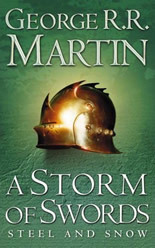 Back with the third installment in the Song of Fire and Ice series! By the end of book II, A Clash of Kings, a number of interesting developments took place. Stannis Baratheon's attack on King's Landing ended in failure, Robb Stark's campaign south began to suffer some setbacks, and John Snow had taken up with the Wildlings. In addition, Theon Greyjoy was killed, Winterfell was burned to the ground, Arya once again escaped and began heading north once again, and young Bran began to head for the Wall with his companions, pursuing a prescient dream.
Back with the third installment in the Song of Fire and Ice series! By the end of book II, A Clash of Kings, a number of interesting developments took place. Stannis Baratheon's attack on King's Landing ended in failure, Robb Stark's campaign south began to suffer some setbacks, and John Snow had taken up with the Wildlings. In addition, Theon Greyjoy was killed, Winterfell was burned to the ground, Arya once again escaped and began heading north once again, and young Bran began to head for the Wall with his companions, pursuing a prescient dream.
A Storm of Swords:
The third novel picks up where all these strands left off, with the War of the Five Kings, the war in the north, and with Daenerys Targaryen's ongoing efforts to secure an army and return to Westeros. Much like book II, Storm contained a sort of mini-climax where we a major battle takes place, this time at the Wall. John's time spent amongst the Wildlings also gives the reader insight into the lives of the Wildlings and what is driving them south.
At the same time, there is a great amount of detail given to events in the East, where Daenerys is travelling to the ancient slaver cities of Astapor and Yunkai. Much like Qarth in book II, these eastern cities are clearly inspired by the ancient cities of Asia Minor and the Middle East (aka. Babylon, Antioch, Jerusalem, etc). However, there were also some rather dire occurrences as well. Like I said in my previous post, George RR Martin is never one to shy away from killing off main characters or devastating his readers. Whereas Clash kind of shied away from that, this book got right into it! But more on that in a bit. First, I'd like to get into the plot in some detail…
Plot Synopsis: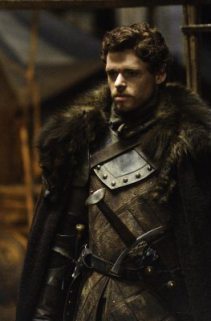 Starting at the Riverlands, where Robb Stark and his armies are gathered, we learn that the Wolf has suffered from some serious errors in judgement. For starters, his uncle, contrary to Robb's orders, threw off his long-term strategy by engaging Tywin Lannisters armies at the river crossings. Though they were victorious in thwarting them, this move upset Robb's plans to lure Tywin closer to his home town of Casterly Rock, where Robb hoped to outflank him and end the Lannister's involvement in the war. However, Tywin instead placed the bulk of his forces to attack Riverrun, and once he learned that King's Landing was threatened, was in a better position to deploy south and protect it. Their victory in the south has also led to an alliance between House Tyrell and the Lannisters, which will make them doubly hard to beat.
Starting at the Riverlands, where Robb Stark and his armies are gathered, we learn that the Wolf has suffered from some serious errors in judgement. For starters, his uncle, contrary to Robb's orders, threw off his long-term strategy by engaging Tywin Lannisters armies at the river crossings. Though they were victorious in thwarting them, this move upset Robb's plans to lure Tywin closer to his home town of Casterly Rock, where Robb hoped to outflank him and end the Lannister's involvement in the war. However, Tywin instead placed the bulk of his forces to attack Riverrun, and once he learned that King's Landing was threatened, was in a better position to deploy south and protect it. Their victory in the south has also led to an alliance between House Tyrell and the Lannisters, which will make them doubly hard to beat.
In addition, while he was campaigning in Lannister country, Robb fell in love with a young woman of a smaller House and married her. This decision has insulted the honor of House Frey, the Lord that controls the Twins (the river crossing to the north) and one of Robb's most powerful allies. Now he must travel to the Twins and make amends, promising his uncle's hand to one of Frey's oldest daughters in order to salvage their relationship. And last, but not least, he also has the defiance of his mother to deal with. It seems that while he was away campaigning, she set Jaime Lannister go and told Brienne to escort him to King's Landing. On his honor, she made Jaime swear that he would return her daughters as soon as he arrived. A desperate hope, but given what happened to her boys (she believes them both to have perished at Winterfell) she was desperate and distraught.
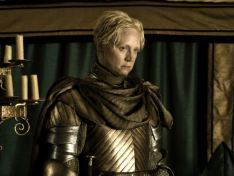 Naturally, Jaime has plans of his own and attempts to escape at the first opportunity. Unfortunately for both of them, his escape attempt leads to their capture. As soon as he obtains a sword, he attacks Brienne and the two fight for some time. The noise alerts a band of Bloody Mummers, who are now in the employ of Lord Roose Bolton of Harrenhal, and they are taken captive. To ensure Jaime's cooperation, Vargo Hoat, the leader of the pack, slices off Jaime's hand. Without his sword hand, Jaime becomes a depressed shell of his former self, and begins to contemplate his choices and allegiances.
Naturally, Jaime has plans of his own and attempts to escape at the first opportunity. Unfortunately for both of them, his escape attempt leads to their capture. As soon as he obtains a sword, he attacks Brienne and the two fight for some time. The noise alerts a band of Bloody Mummers, who are now in the employ of Lord Roose Bolton of Harrenhal, and they are taken captive. To ensure Jaime's cooperation, Vargo Hoat, the leader of the pack, slices off Jaime's hand. Without his sword hand, Jaime becomes a depressed shell of his former self, and begins to contemplate his choices and allegiances.
When Robb and his host arrive at the Twins, they are pleasantly surprised. Despite Lord Walder Frey's reputation for being a bitter and vengeful man, he seems committed to making this new marriage happen. And his uncle is even pleasantly surprised when he sets eyes on the Frey girl, who doesn't appear to be as hideous as his other offspring! Everything goes well on the wedding night as well. Though the food is not so good, the wine is plentiful and people begin to soused. However, once the bride and groom are hauled off, Frey has another surprise! Crossbowmen emerge from the gallery and begin firing on them! Robb and his banner men are quickly surrounded, and Robb and his mother are killed!
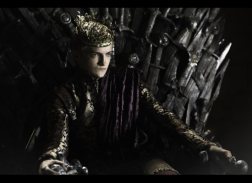 Back at King's Landing, celebrations are being held! With their victory over Stannis' forces, the people are jubilant and welcoming House Tyrell as liberators. In addition, Lord Tywin has taken the role as Hand of the King since Tyrion has been bed-ridden with injuries and is suspected of trying to harm Joffrey. Also, it seems that the new hand has made some changes to Joffrey's wedding arrangements. Instead of marrying Sansa, as was arranged under King Robert, he now wishes to cement the Lannister's new alliance with the Tyrell's by marrying Joffrey to Lady Margaery Tyrell instead. Sansa is relieved, until she is informed that she will be wedding Tyrion instead, who isn't particularly happy about it either.
Back at King's Landing, celebrations are being held! With their victory over Stannis' forces, the people are jubilant and welcoming House Tyrell as liberators. In addition, Lord Tywin has taken the role as Hand of the King since Tyrion has been bed-ridden with injuries and is suspected of trying to harm Joffrey. Also, it seems that the new hand has made some changes to Joffrey's wedding arrangements. Instead of marrying Sansa, as was arranged under King Robert, he now wishes to cement the Lannister's new alliance with the Tyrell's by marrying Joffrey to Lady Margaery Tyrell instead. Sansa is relieved, until she is informed that she will be wedding Tyrion instead, who isn't particularly happy about it either.
Now two weddings must be held. The first, of Sansa and Tyrion, is quite the sham and is rushed through with minimal pomp and ceremony. For the second wedding though, much time and preparation are dedicated. In addition, Sansa finds herself being taken into the confidences of the matriarch of House Tyrell. As Joffrey's previous betrothal, she would like to know just what kind of man her granddaughter is marrying. After learning that the old lady is an honest and gentle person, Sansa tells her the truth: Joffrey is a monster, and her granddaughter should be afraid. The old lady thanks her for her honesty, and begins plotting…
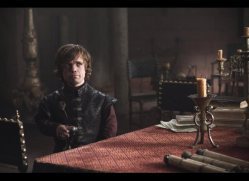 The wedding festivities are lavish and Joffrey appears to be taking well to his new wife, which leaves Sansa fearing for her life. Tyrion is similarly worried, knowing that Joffre hates him and Cersei and their father both suspect him of treachery. He worries that the boy will try to kill him and his new wife, but they are both saved when something unexpected occurs. In the midst of eating from a massive pigeon pie that was prepared for the event, Joffrey chokes and dies horribly. More to the point, the girl Sansa disappears in the midst of his death. All eyes go to Tyrion, who is promptly arrested for the boy's death.
The wedding festivities are lavish and Joffrey appears to be taking well to his new wife, which leaves Sansa fearing for her life. Tyrion is similarly worried, knowing that Joffre hates him and Cersei and their father both suspect him of treachery. He worries that the boy will try to kill him and his new wife, but they are both saved when something unexpected occurs. In the midst of eating from a massive pigeon pie that was prepared for the event, Joffrey chokes and dies horribly. More to the point, the girl Sansa disappears in the midst of his death. All eyes go to Tyrion, who is promptly arrested for the boy's death.
After suffering in the dungeons of King's Landing for a time, Tyrion is brought forth and put on trial. He is forsaken by everyone, including his mistress Shae, who appears to have been threatened into giving him up. All hope appears to be lost for Tyrion, but he then receives an offer from an unlikely source, Lord Oberyn Martell, the Prince of Dorne. It seems that the people of Sunspear still hold the Lannister's accountable for the deaths of two Martell children who were murdered during Robert's revolt. The one responsible was Sir Gregor Clegane ("The Mountain"), but they suspect Tywin was the one who gave the order. He agrees to fight for Tyrion if he requests a trial by combat as part of a plot to kill Gregor and eventually put a Martell on the throne.
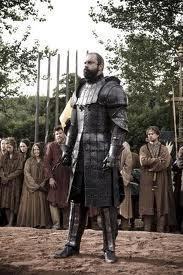 Without options, Tywin agrees, and as expected, Cersei chooses Gregor as her champion. The fight goes well for Oberyn, who employs cunning and speed to defeat Gregor with a poisoned spear. However, before he can deliver the final blow, Gregor takes Oberyn by the throat and smashes his head. Tyrion is once again doomed, and Gregor is destined to die a slow and terrible death. However, Tyrion is once again saved, this time from his brother who has returned. After hearing of Robb Stark's death, Harrenhal once again changed hands and Jaime was set free. Having undergone a change of heart, he decided to bring Brienne back with her.
Without options, Tywin agrees, and as expected, Cersei chooses Gregor as her champion. The fight goes well for Oberyn, who employs cunning and speed to defeat Gregor with a poisoned spear. However, before he can deliver the final blow, Gregor takes Oberyn by the throat and smashes his head. Tyrion is once again doomed, and Gregor is destined to die a slow and terrible death. However, Tyrion is once again saved, this time from his brother who has returned. After hearing of Robb Stark's death, Harrenhal once again changed hands and Jaime was set free. Having undergone a change of heart, he decided to bring Brienne back with her.
Upon his arrival, he and Cersei have a falling out over his brother's supposed guilt, and he decides to set Tyrion free. This consists of showing him a secret stairway that will take him to the coast, but Tyrion decides to head up instead to the tower of the Hand. He knows his father is there, and when he enters, finds Shae warming his bed. She pleads and offers him the usual denials, but he strangles her, grabs a crossbow from the wall, and corners his father in the privy. After some harsh words are exchanged, he fires a bolt into Tywin's stomach and leaves him for dead.
With both Joffre and Tywin dead, Cersei takes up the role of Hand and crowns her youngest son, Tommen, as king. In addition, she charges her newly-estranged brother with finding and killing Tyrion. As the new Lord Commander of the Kingsgaurd, it is his duty with tracking down the assassin, but he is obviously conflicted given that he played a hand in his father's death. Once the funeral is over, he decides to sets Brienne free and gives her a new sword named Oathkeeper. This was apparently Joffre's wedding gift from his father, which was reforged from the Valyrian steel of Ned Stark's old sword. He then tells her to go forth and keep her oath to Catelyn to find Arya and Sansa.
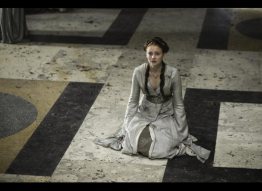 Sansa is meanwhile ferried away with the help of Lord Donton, a disgraced ex-knight who Joffre was in the habit of abusing, but whom Sansa was kind to. For some time, they were planning her escape, and when she learned that she would be wed to Tyrion instead of a Tyrell, she agreed to his plans. After removing her from the capitol, she is transferred to a ship waiting for them down by the water. Her rescuer, it seems, is Lord Petyr Baelish, who plans to take her to The Eyrie where he is about to wed her aunt (Catelyn's sister). After delivering her aboard, Donton is killed to cover their tracks.
Sansa is meanwhile ferried away with the help of Lord Donton, a disgraced ex-knight who Joffre was in the habit of abusing, but whom Sansa was kind to. For some time, they were planning her escape, and when she learned that she would be wed to Tyrion instead of a Tyrell, she agreed to his plans. After removing her from the capitol, she is transferred to a ship waiting for them down by the water. Her rescuer, it seems, is Lord Petyr Baelish, who plans to take her to The Eyrie where he is about to wed her aunt (Catelyn's sister). After delivering her aboard, Donton is killed to cover their tracks.
She is then sailed to the coast of the Vale of Arryn where she meets Petyr and her aunt. While it is clear that Lady Lysa loves Petyr, it is also clear that he doesn't love her, but instead is carrying a torch for Sansa. After arriving at the Eyrie, he kisses Sansa in the courtyard, sending Lysa into a jealous rage. Later on, she invites Sansa up to the throneroom and threatens to throw her out the Moon Door, but Petyr intervenes. After talking Lysa down, he confesses to her that he only ever loved her sister, and then tosses her out the door! He then moves quickly to blame the minstrel and bribes Lysa's bannermen to ensure their loyalty to his rule.
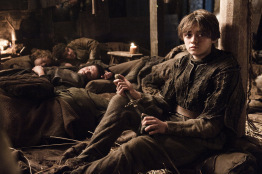 Meanwhile, Arya's trip north brings her and her companions into some strange company. Having escaped Harrenhal, she now comes into contact with a group of men known as the Brotherhood without Banners. These were the men whom Ned Stark had sent out to deal with the raids in the Riverlands, but who now are protecting the countryfolks from raiders and Lannisters. Leading them is Lord Beric Dondarrion who has picked up an usual companion, the red priest Thoros of Myr. Here too is another worshiper of R'hllor, who has apparently used his magic to resurrect Beric in the past.
Meanwhile, Arya's trip north brings her and her companions into some strange company. Having escaped Harrenhal, she now comes into contact with a group of men known as the Brotherhood without Banners. These were the men whom Ned Stark had sent out to deal with the raids in the Riverlands, but who now are protecting the countryfolks from raiders and Lannisters. Leading them is Lord Beric Dondarrion who has picked up an usual companion, the red priest Thoros of Myr. Here too is another worshiper of R'hllor, who has apparently used his magic to resurrect Beric in the past.
Having been taken in by the company, they soon find Sandore Clegane, who fled King's Landing during the siege, and put him on trial for his many crimes. Sandore request a trial by combat and narrowly wins when Beric's sword breaks and he dies. However, Thoros is able to resurrect him yet again, and Sandore is free to go. But before he leaves, he is sure to take a hostage – Arya Stark! The two then travel north together since Sandore is hoping to ransom her to her brother. This journey takes them to the Twins, just in time for Lord Bolton's supposed wedding. When the pandemonium strikes, Arya is forced to flee and is only saved by the intervention of Sandor himself.
In time, Sandor is critically wounded and Arya leaves him behind. She makes for the Vale of Arryn where she decides to board a ship and head for Braavos. She does this because Jaqen H'ghar, the killer she helped free, gave her a coin before departing which he claimed was from Braavos. The coin contained the inscription "Valar Morghulis". When she arrives at the port, she speaks these words to a Braavosi Captain, who replies "Valar Dohaeris" and agrees to take her aboard. They set sail for the free city of Braavos and Arya bids farewell to her past life.
 To the East, Daenerys and her companions are still busy trying to recruit an army. On the recommendations of Lord Mormont, they set course for Slaver's Bay believing that they will be able to recruit an army from the Unsullied. These are apparently warrior-slaves who have been raised from birth to fight, feel no pain, and obey any and all orders from their commander. With her new found friends, Arstan and Strong Belwas, they arrive at Astapor where she agrees to surrender one of her dragons in exchange for a large host. However, she then tricks the slavers by ordering the Unsullied, once they are transferred to her ownership, to kill all the city's slave masters.
To the East, Daenerys and her companions are still busy trying to recruit an army. On the recommendations of Lord Mormont, they set course for Slaver's Bay believing that they will be able to recruit an army from the Unsullied. These are apparently warrior-slaves who have been raised from birth to fight, feel no pain, and obey any and all orders from their commander. With her new found friends, Arstan and Strong Belwas, they arrive at Astapor where she agrees to surrender one of her dragons in exchange for a large host. However, she then tricks the slavers by ordering the Unsullied, once they are transferred to her ownership, to kill all the city's slave masters.
With her new army and a host of freed slaves, Daenerys sets course for the city of Yunkai next. Here, she finds another slave stronghold that is protected by a host of mercenaries. Here, she is aided by the defection of one of the mercenary Captains, and this city falls easily as well. Finally, she and her host move on to Mereen, the last of the slave cities, but find it walled and heavily defended. They set camp and begin the long process of besieging it.
But first, some revelations are made. On the one hand, she discovers that Arstan is in fact Ser Barristan Selmy, the former Lord Commander of the Kingsguard who Joffre dismissed. His true purpose, it seemed, was to find the heir of the Targaryen line. At the same time, she learns that Jorah Mormont was originally sent to spy on her for Robert. However, when the assassination order came, he changed his mind and enlisted with her. Daenerys is outraged. It seems that the prophecy told to her by the Undying of Qarth is coming true. She has been betrayed twice now, which means she will betrayed once more before the end.
To have them make amends, she orders Barristan and Mormont to sneak into the city through its sewers with a host of Unsullied at night and open the gates. They succeed, and the city is taken shortly thereafter. She forgives Selmy and makes him the Lord Commander of her Queensguard, but decides to banish Lord Mormont. In the meantime, she decides to wait at Mereen and contemplate how she will become the ruler that Westeros needs.
Finally, things to the north are also proceeding apace. Having been captured by the Wildlings, John Snow is brought before Mance Rayder. He is asked to explain why he would defect, and wanting to be convincing, John tells him something approximating the truth. He says he defected because he is sick and tired of being "the bastard son" and wants to be free. Rayder believes him, and John is soon reunited with the young Wildling woman he met earlier and spared.
Her name is Ygritte, and she is clearly taken with John. As time goes on, they become close and claim each other, Wildling-style! As a result of all this, John's feelings of betrayal deepen, but he made an oath to Qorin to learn all he could, so he continues. In time, this bears fruit when he learns that the Others are what is driving the Wildlings south. Hence why they are determined to take the Wall and claim the northern lands of Westeros for themselves.
He also learns that Rayder had been desperately searching for Horn of Winter which the Wildlings believe is magic. By sounding this horn, he believes he can melt the Wall and take out the Night's Watch easily. However, in the meantime, he must commit his forces to attacking the Wall conventionally and sends John and Ygritte with an advance party to scale the wall and do reconnaissance on the other side. Once over, John escapes from the Wildlings once more and rejoins his brothers at Castle Black.
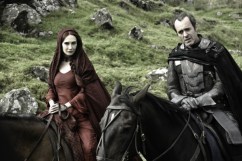 After convincing them that he defected as part of a plan that Qorin drafted, John is given leave to command the defense of the Wall from the first assault. Over forty-thousand Wildlings assault the Wall, along with giants, mammoths and improvised siege engines. However, John and his brothers are successful in repelling the first wave. John is then invited to parlay with Rayder, who reveals that he has found the horn after all. He tells John that he cold destroy the Wall, but would rather capture it intact, since it is the only thing that will keep the Others at bay. John considers his offer of a negotiated truce, but their parlay is cut short when Stannis' surviving armies take to the field and destroy the Wildling encampment.
After convincing them that he defected as part of a plan that Qorin drafted, John is given leave to command the defense of the Wall from the first assault. Over forty-thousand Wildlings assault the Wall, along with giants, mammoths and improvised siege engines. However, John and his brothers are successful in repelling the first wave. John is then invited to parlay with Rayder, who reveals that he has found the horn after all. He tells John that he cold destroy the Wall, but would rather capture it intact, since it is the only thing that will keep the Others at bay. John considers his offer of a negotiated truce, but their parlay is cut short when Stannis' surviving armies take to the field and destroy the Wildling encampment.
For months, the Night's Watch had been pleading for aid and soldiers to be sent to the Wall, and now it seems that only Stannis has answered. He tells John what the priestess Melissandre believes, how the return of the Others is just a prelude to the return of her god's sworn enemy. Stannis asks for John's support and promises him Winterfell in exchange, but John is chosen by the Night's Watch as their new commander and must refuse.
In the epilogue, we see the Brothers Without Banners have taken one of the Frey men prisoner. After interrogating him about the massacre that happened at the wedding, the reanimated body of Catelyn Stark arrives and orders his death. It seems that the priest Thoros has used his magic to resurrect her as well, and now she is intent on revenge!
Strengths/Weaknesses:
Book III was, in my humble opinion, a step down from books I and II. On the one hand, there was plenty of action and plot developments to keep the reader interested, and plenty of surprises besides. However, not all of them were welcome to this humble reader. For starters, when Robb Stark is murdered at the court of Walder Frey, I was incensed! I very nearly put the book down and didn't pick it back up. Was it not enough that Martin had to kill off Ned Stark? No, he had to kill his son and Catelyn too? The Starks are supposed to be the heroes of this series, you can't keep killing them off! Yes, I was mad…
But it was not just the fact that sympathetic characters kept getting murdered. It was the confusion it caused. Basically, every story has a set of main characters, people whom the story advances through. When a character dies off, it naturally falls to another to keep the story going. Now we all know that Martin uses many characters and perspectives in his novels, but most of these are secondary and rarely heard from. It's the main perspectives that tell things of the greatest importance, and usually there are only a few of them. When these people die, it has the effect of making the reader think that they weren't so important after all. And if it keeps happening, the reader can become cynical and forgoes the usual emotional attachments to characters. When that happens, a story dies, at least for the person reading it. It's all about emotional attachments Martin, you can't keep traumatizing us!
More than that, I was beginning to feel tedious and depressed by the way Arya and Sansa's sad stories kept going on and on. For two books now, Arya has been trying to get home, only to be waylayed, taken prisoner, get free, taken prisoner again, get free once again, only to find out that her family is dead. Thus she decides to go to Braavos because she thinks she's the only Stark left. And she's just a kid! How depressing! Sansa, on the other hand, has to endure Joffre's constant abuse, the prospect of sex with Tyrion, and then is set free only to find herself a prisoner again, just under different circumstances. As if the rapacious and cruel Lannisters weren't enough, now she has to deal with the murderous and creepy Lord Baelish!
And even before Robb was murdered, the setbacks he was been forced to endure were beginning to get tiresome as well. In spite of all his early successes, a few things beyond his control thwart his plans. Then he gets stabbed in the back by Theon who decides to seize Winterfell, his attempts to liberate it fail, and he gets to hear of how it was burned to the ground and his brothers were killed! Then on top of that, its clear his alliance is going to fall apart because he chose to follow his heart. And just when it seems like things are going to be okay for the young wolf, someone stabs him through it. It's like, we get it! War is hell, especially this war, and the bad guys are winning! But can't you give us some happy news for a change?
But like I said, the book had plenty of things to keep the prospective reader interested. After picking it back up (after about a week or so of stewing), there were plenty of good things that brought me back into the series. For starters, Joffre did die (finally!), Lord Tywin also bought it while sitting on the privy, and Catelyn was revealed to be alive (albeit in a somewhat hideous form). This was all nice to read, mainly because I was getting so sick of Joffre that I was just waiting for someone to give him a "golden crown" as well! His and Tywin's death also brightened Tyrion's storyline a lot, seeing as how his constant struggle with his cruel family was also becoming quite depressing. Given that he is one of the few sympathetic characters from that thread, it was nice to see him get a little payback! Now if someone would kill Cersei we'd be in business!
And of course there were all the plot developments that keep satisfying my curiosity. Much like in book II, there were plenty of things that I was just waiting to hear about that finally got revealed. For instance, I was dying to know what would become of the Others invasion, of the civil war, of Daenerys' plans to return to Westeros, and of Bran's visions. After so much build-up, set-backs and plot twists, I was dying for some resolution! And as usual, George RR Martin gives it out sparingly, providing clues, some answers, and a few interesting tidbits, all the while ensuring that the plot keeps rolling into the next book.
All in all, I liked this book. It was a very decent follow-up to A Clash of Kings and maintained the commitment to realism, detail and world-building that the series is famous for. My problems really only stem from the fact that at times, the books are too realistic, too detailed, and contain far too many plot twists. However, it would be unfair to say that any one book fails in this regard when its really a cumulative effect. Anything bad that I can say about this particular novel always begins with "at this point in the series…" Mainly, I was just hoping that things would be close to some kind of resolution. That's another thing thats important when writing. When audiences wait to long for a resolution, they'll also lose interest. I hope Mr. Martin is writing this down 
Speaking of which, I am currently nose-deep in A Feast For Crows. See you soon with the review for that one!









